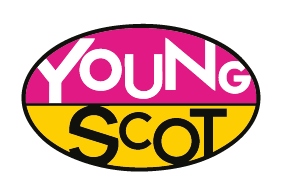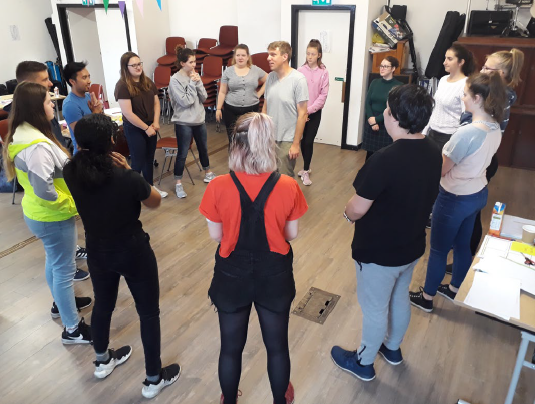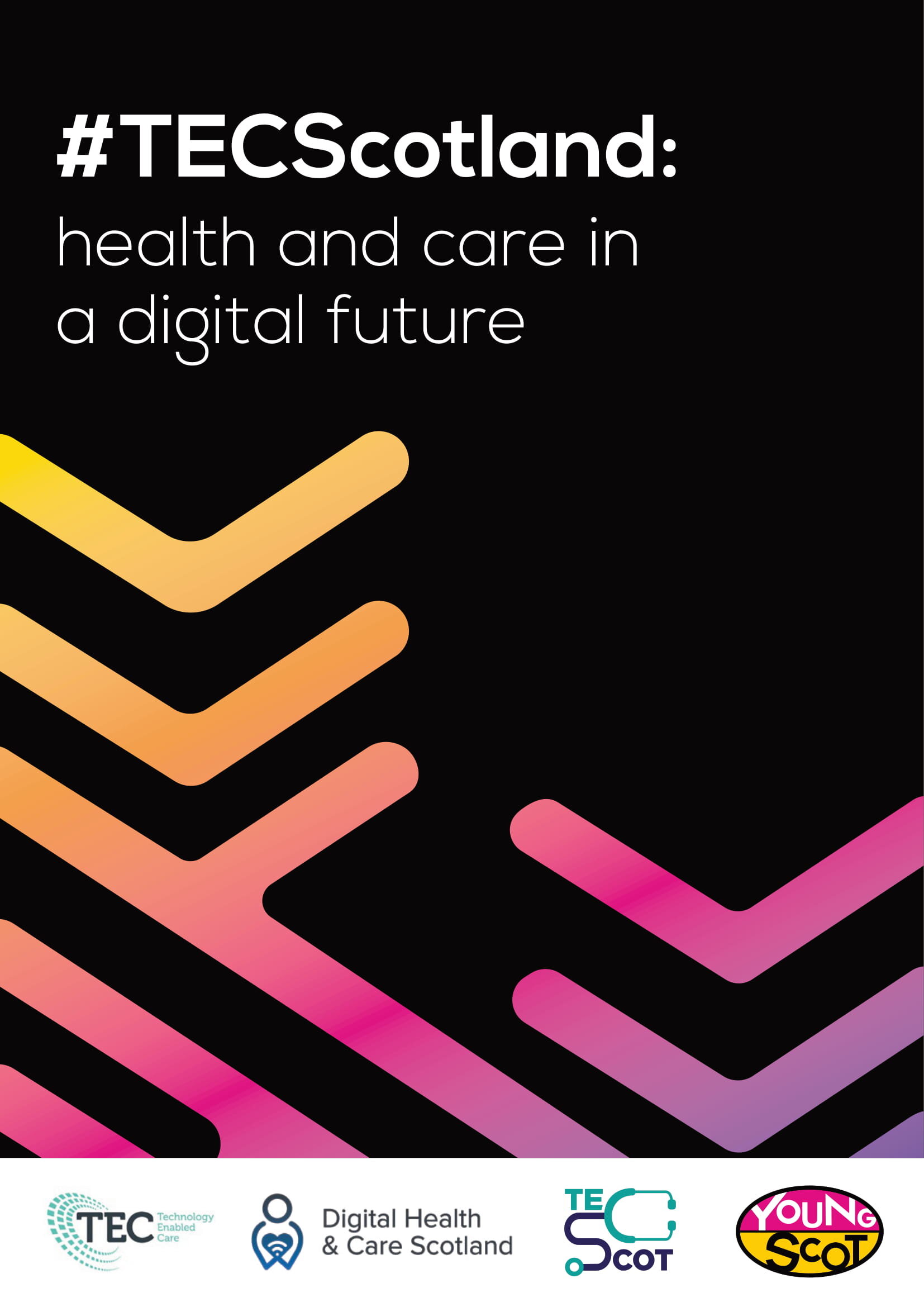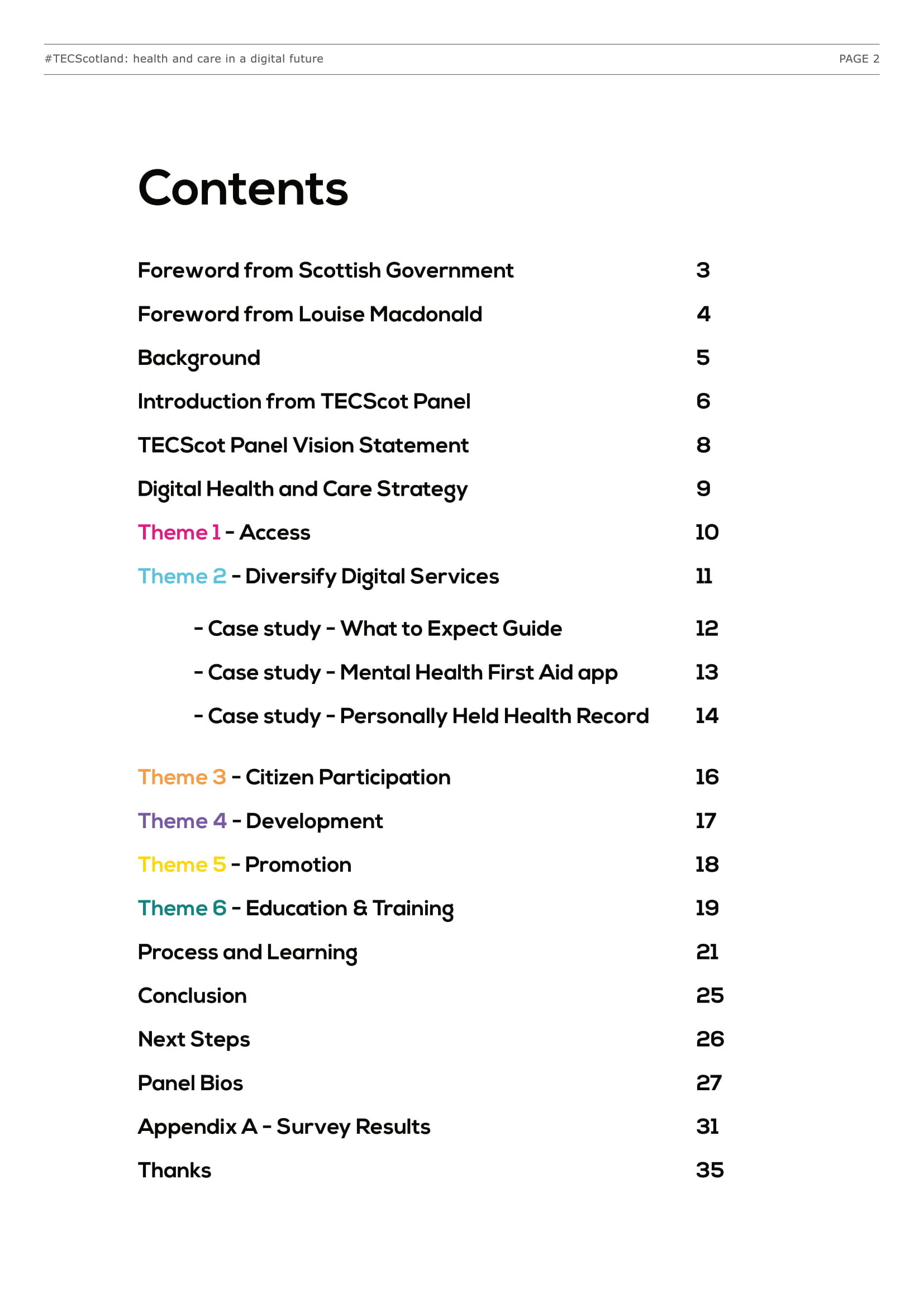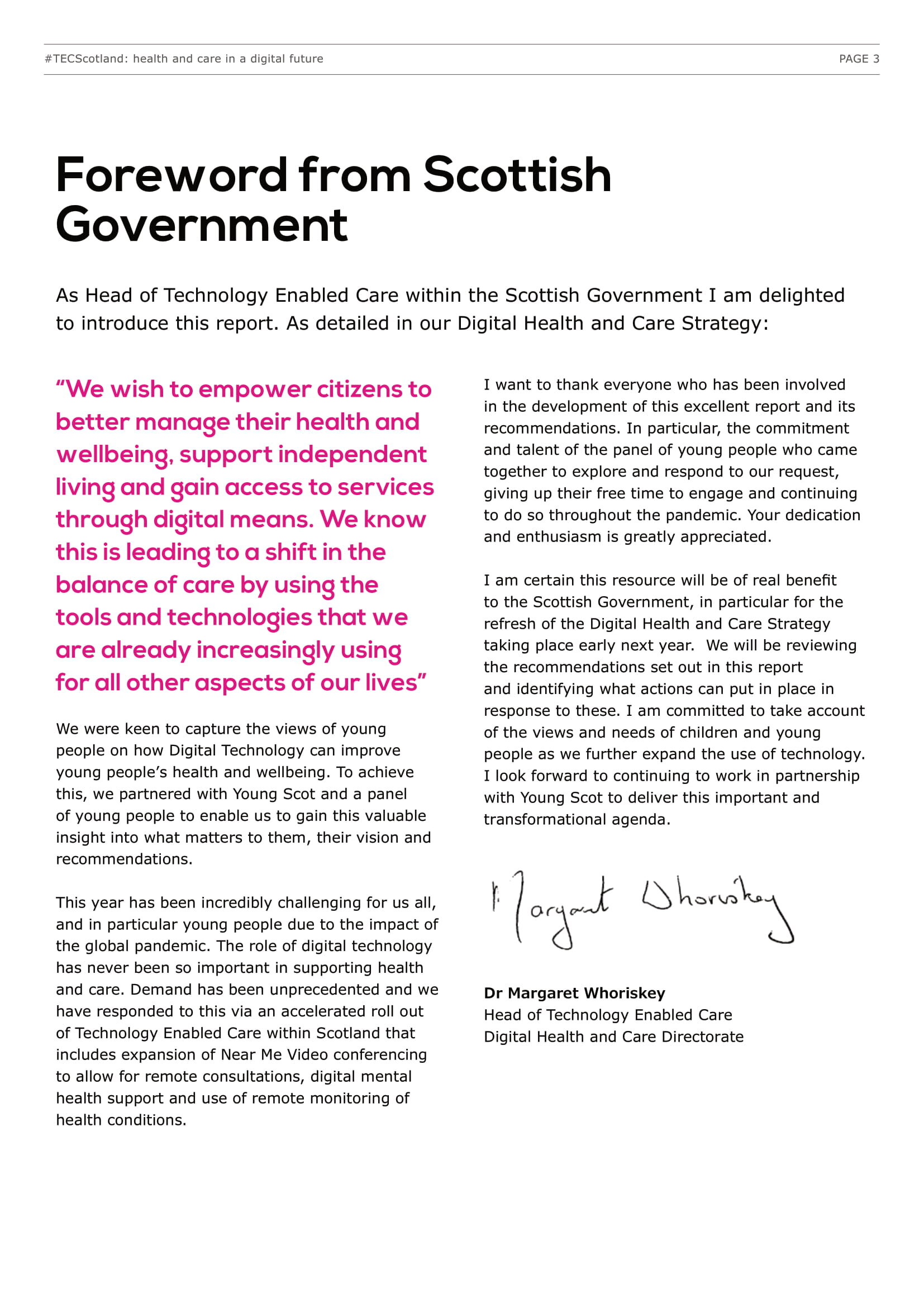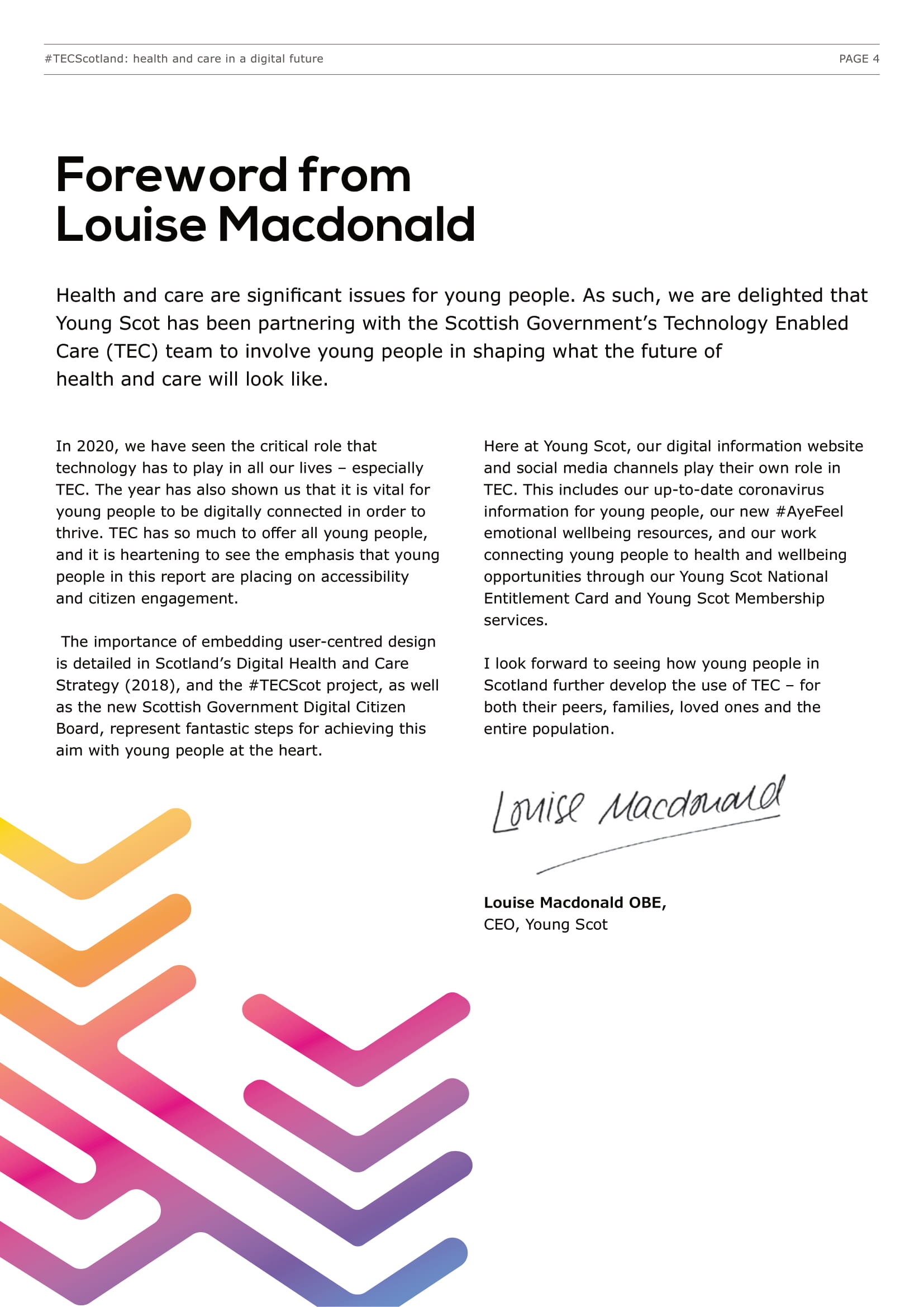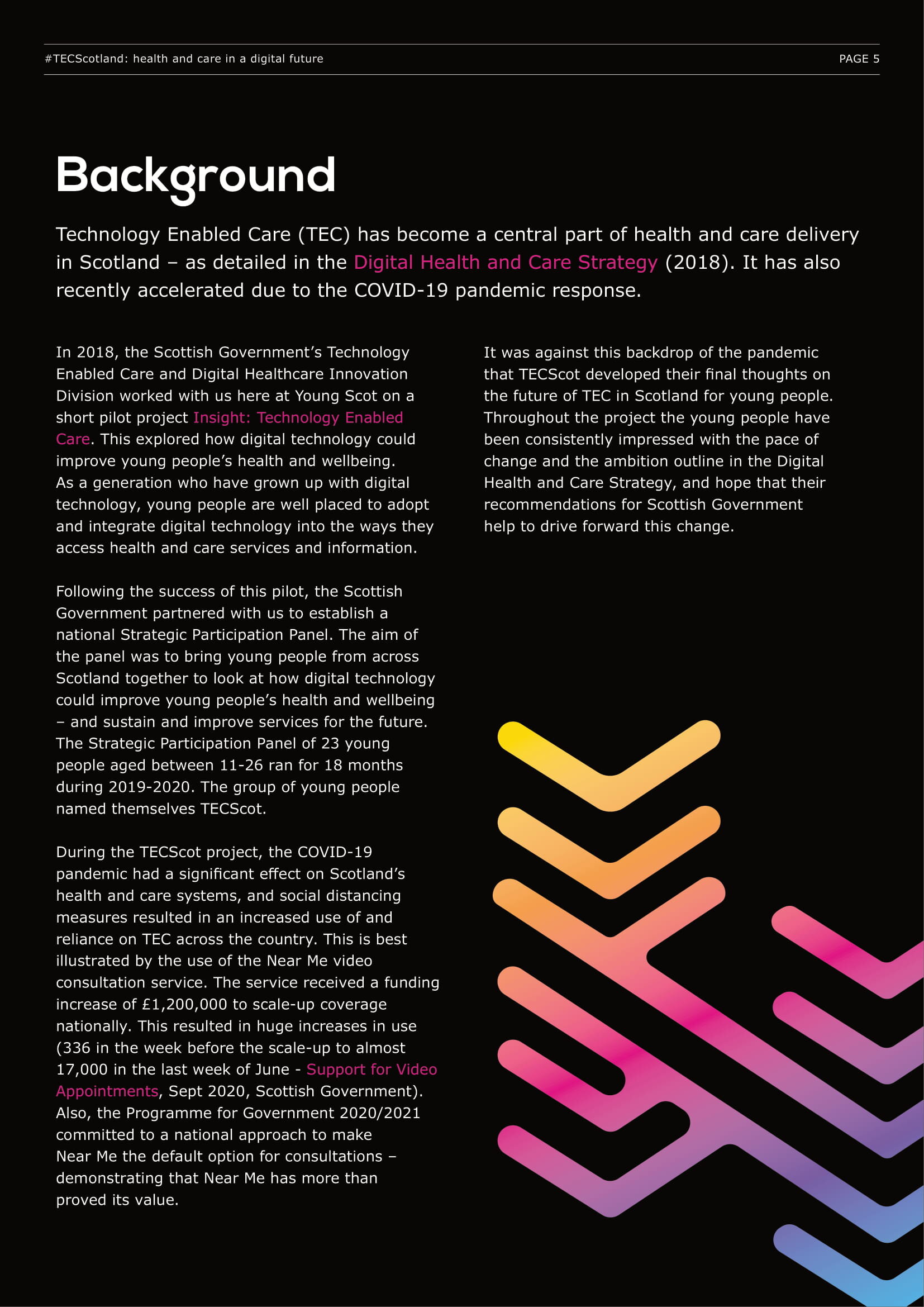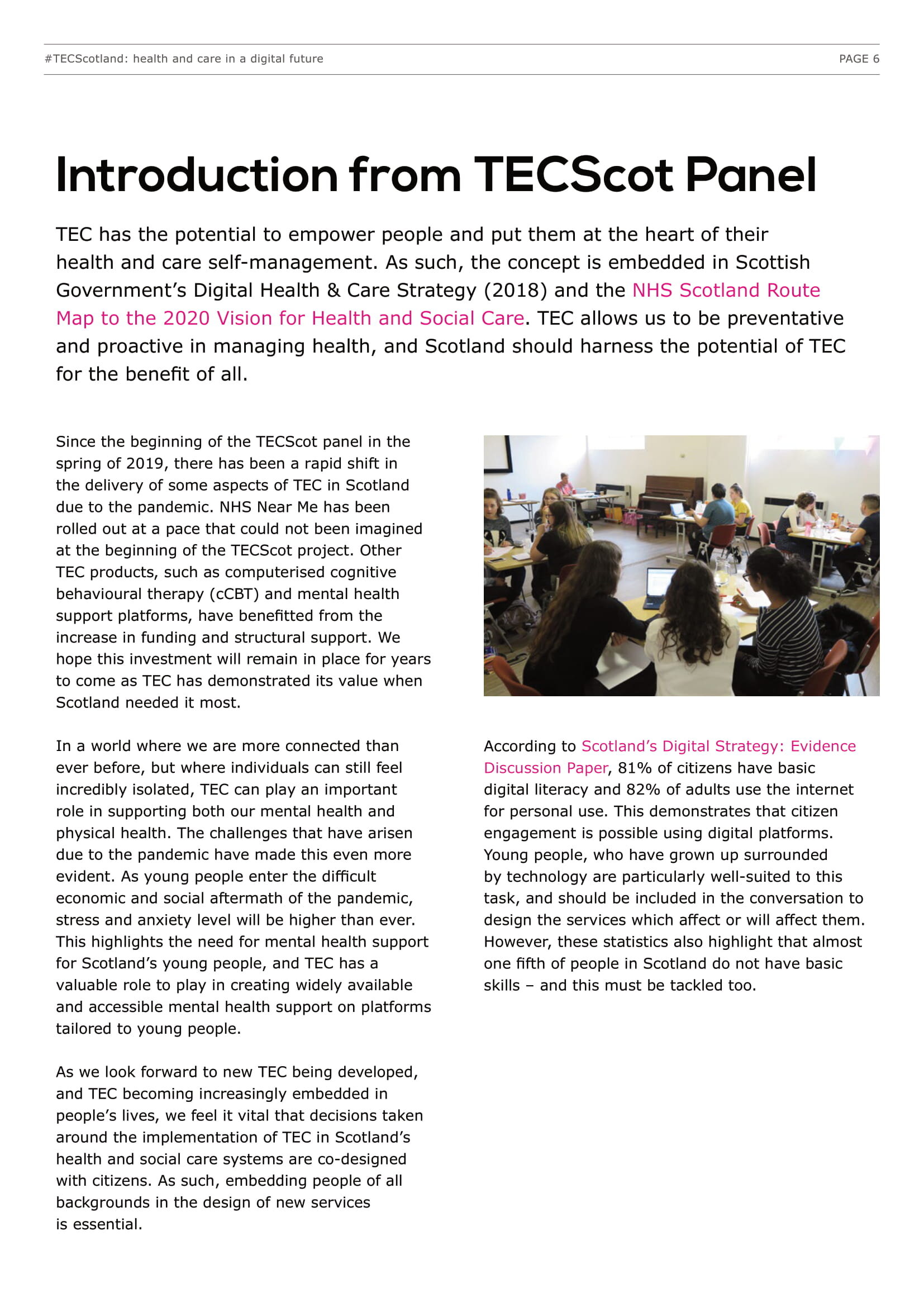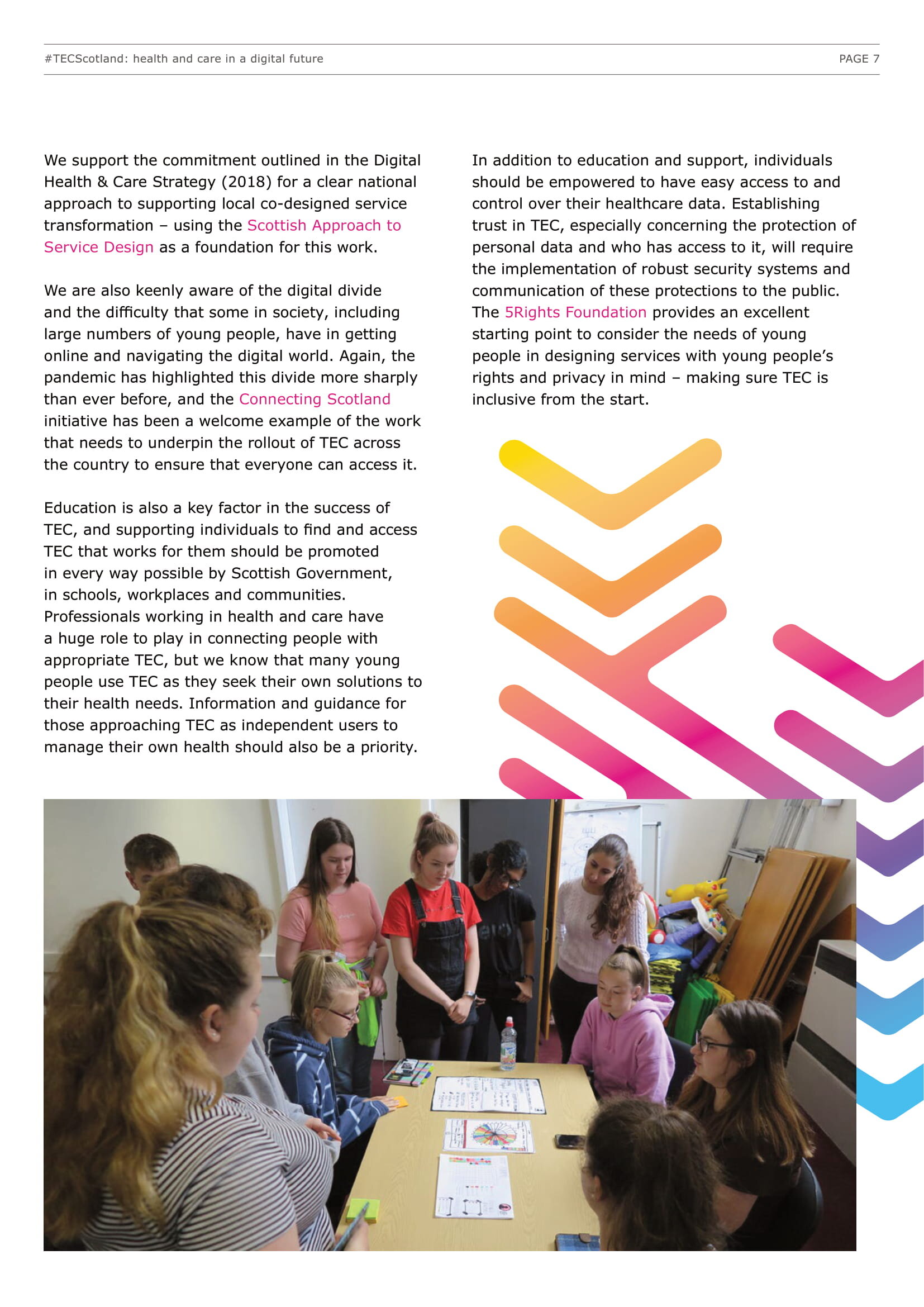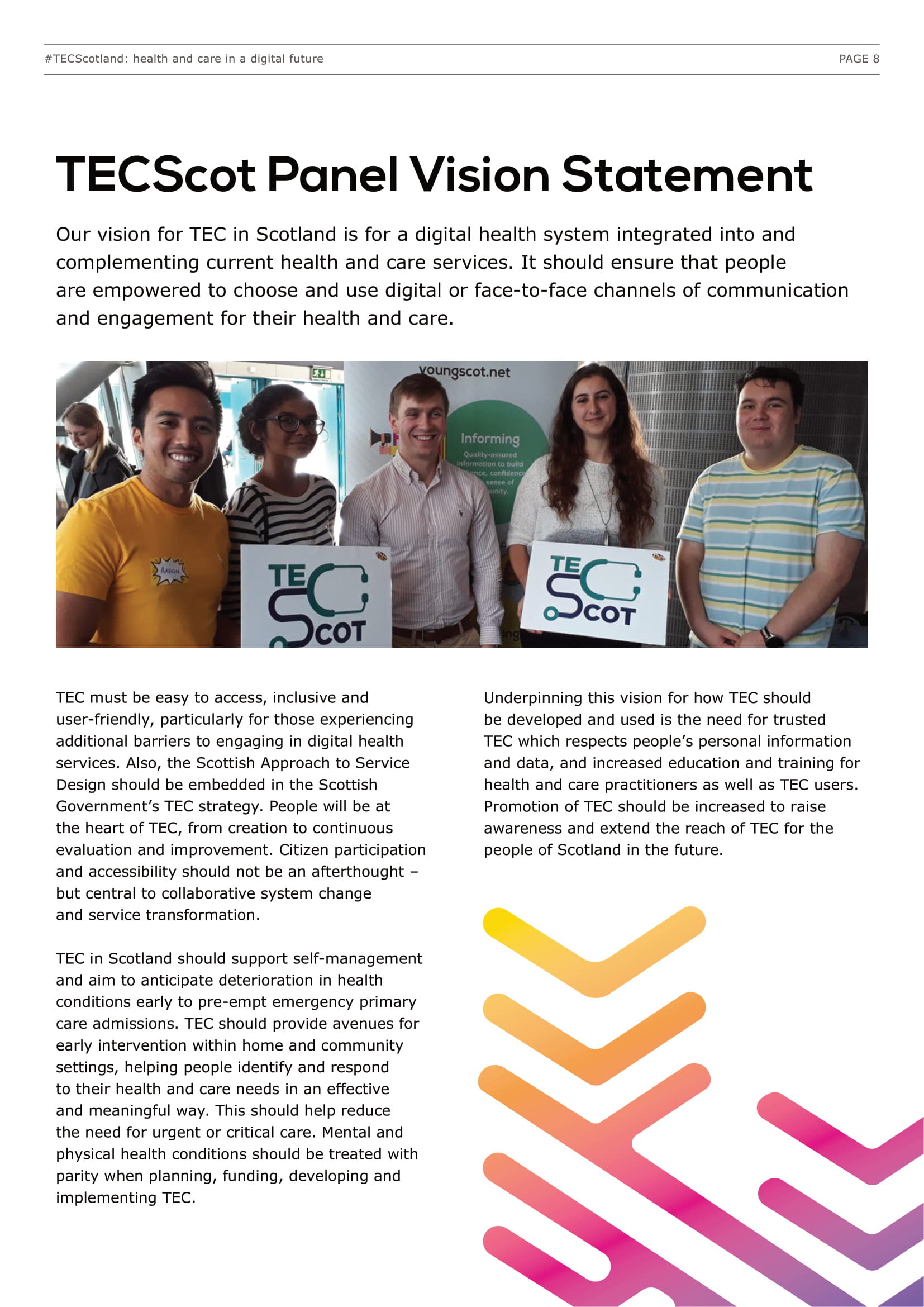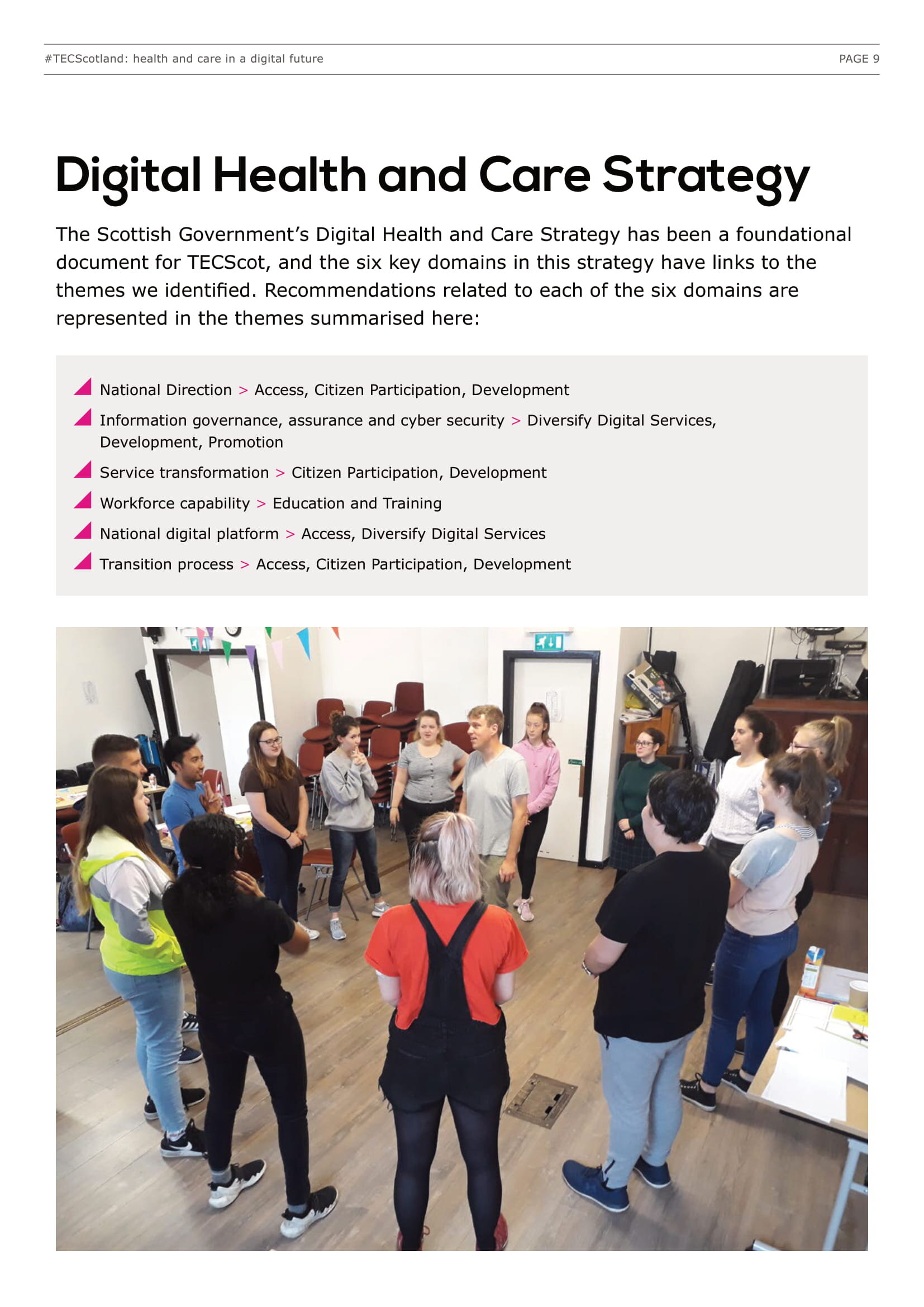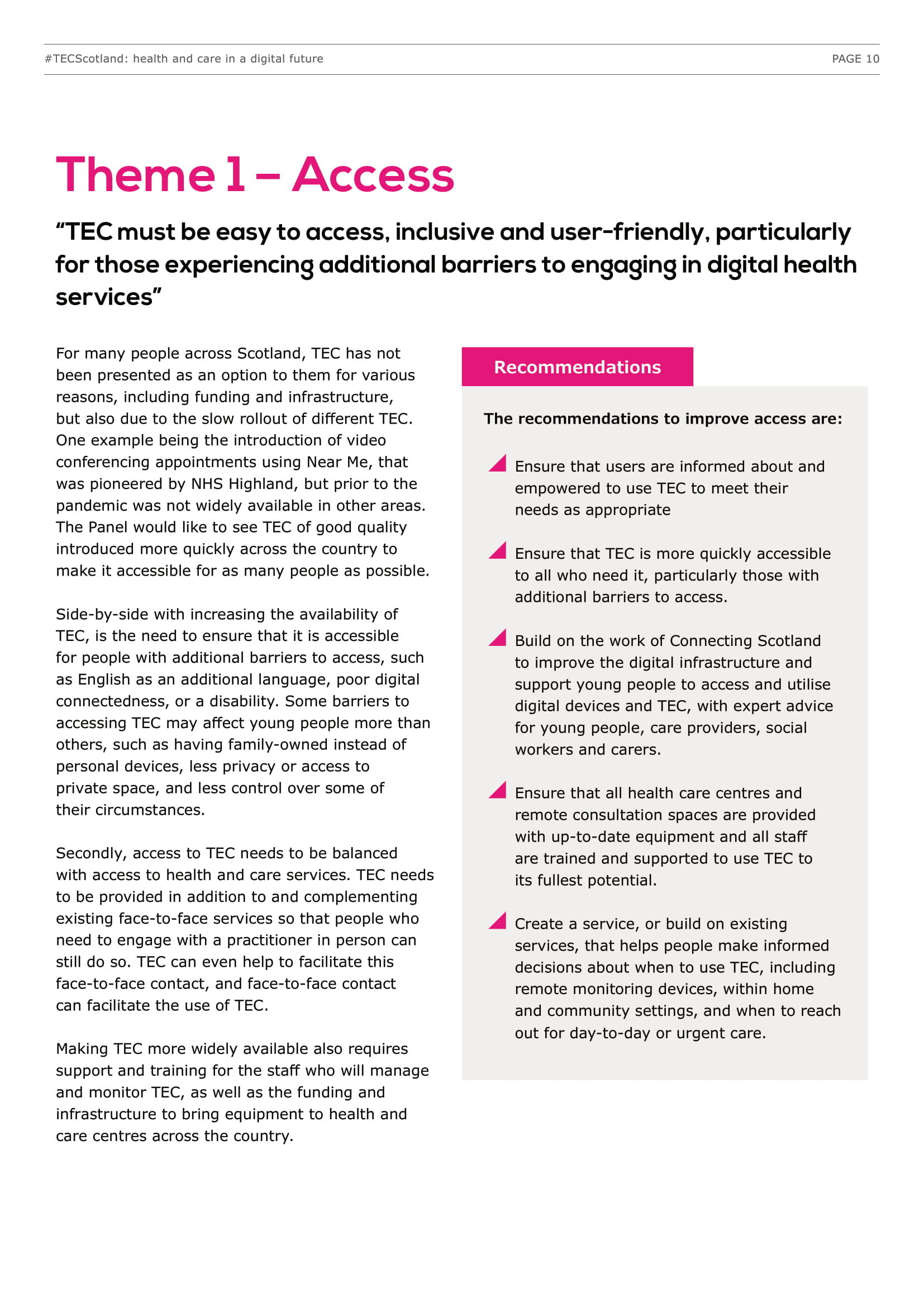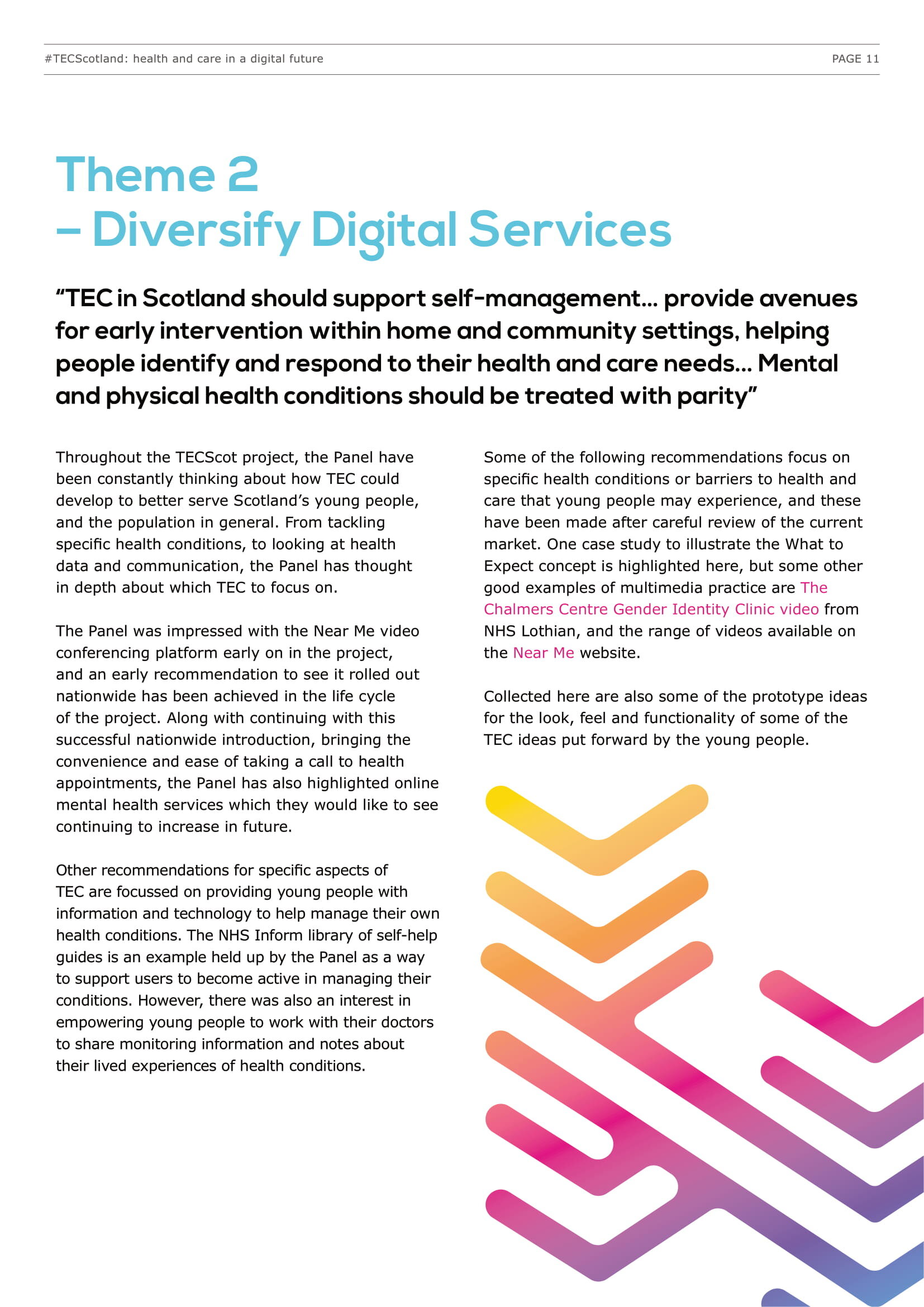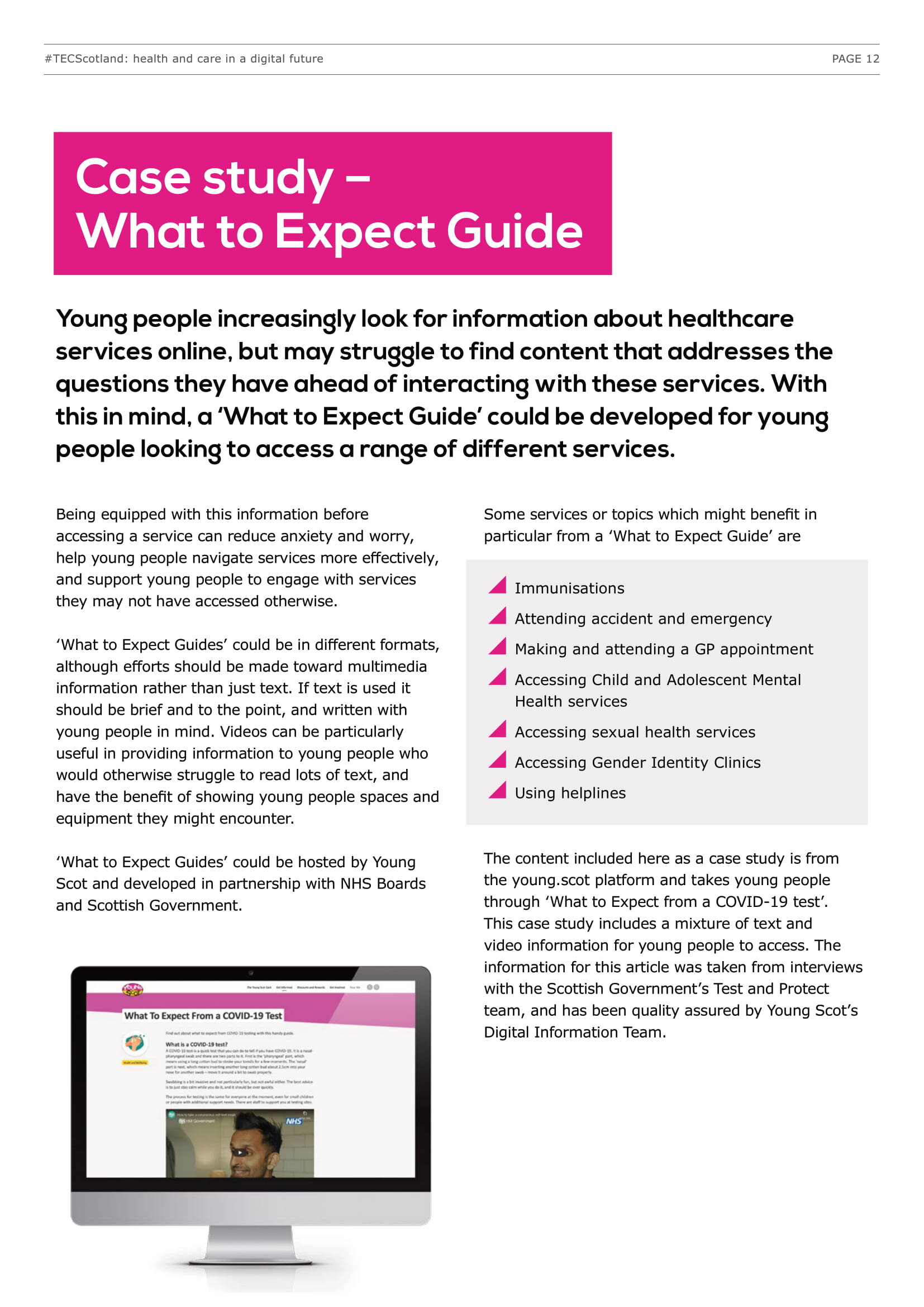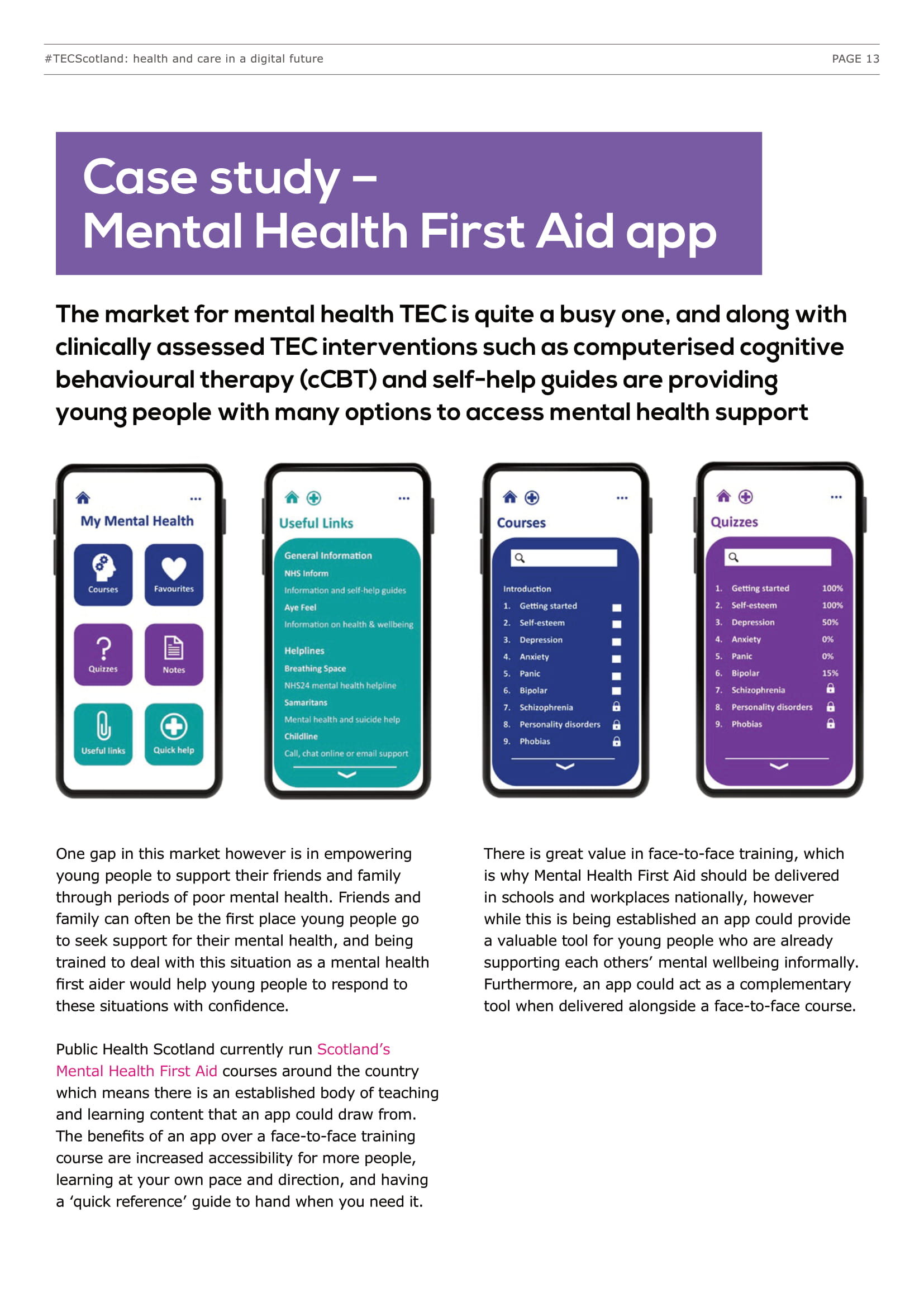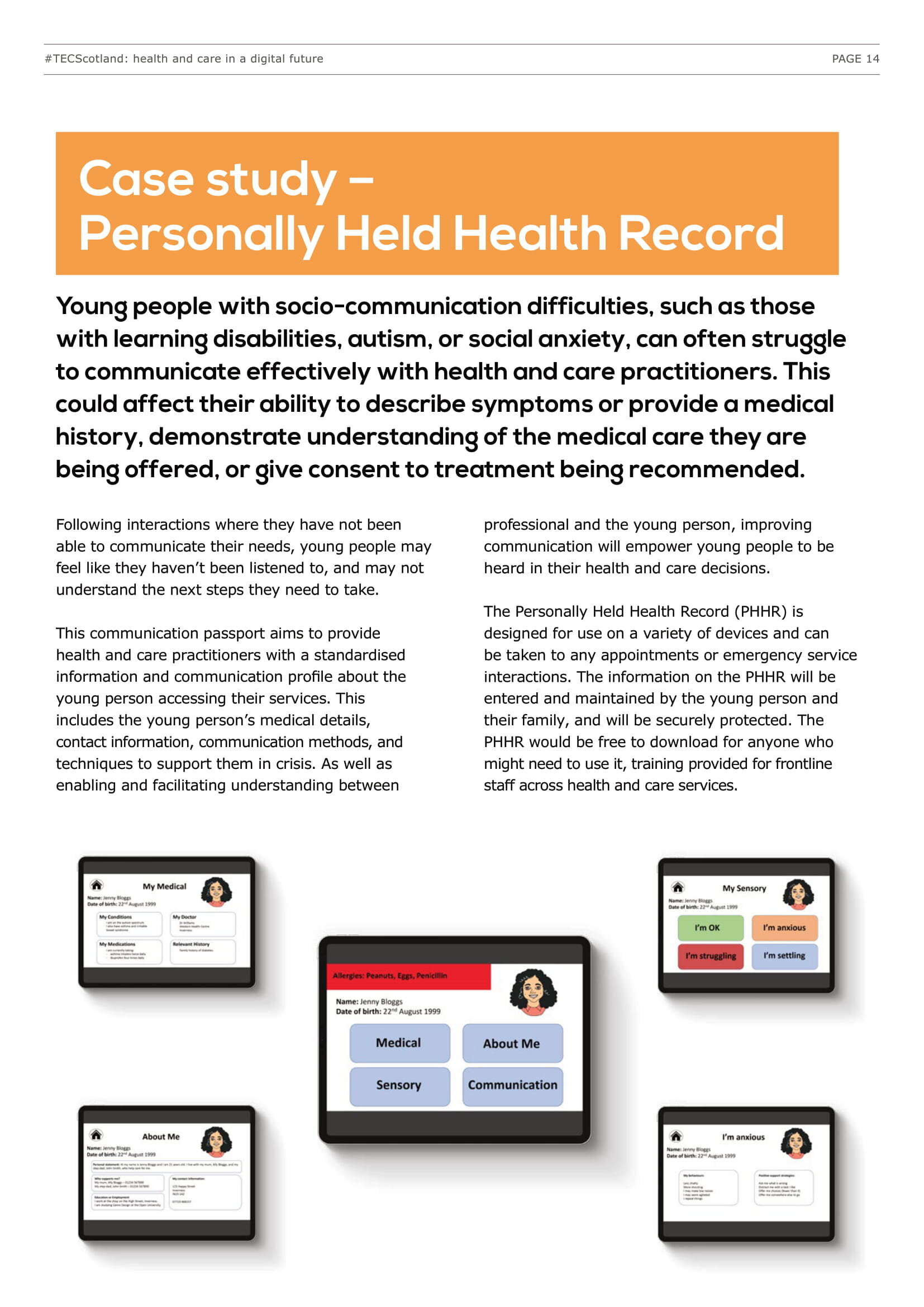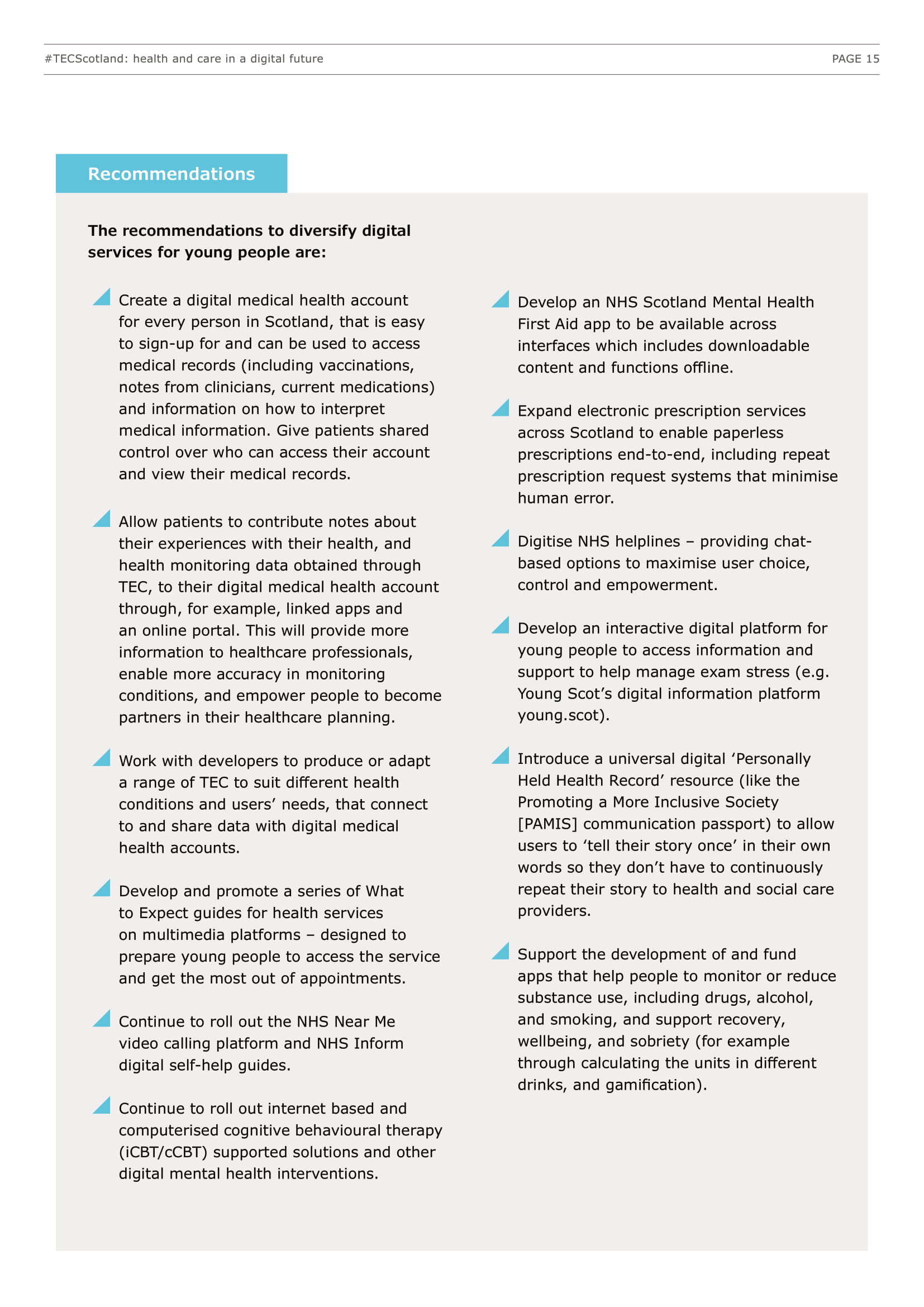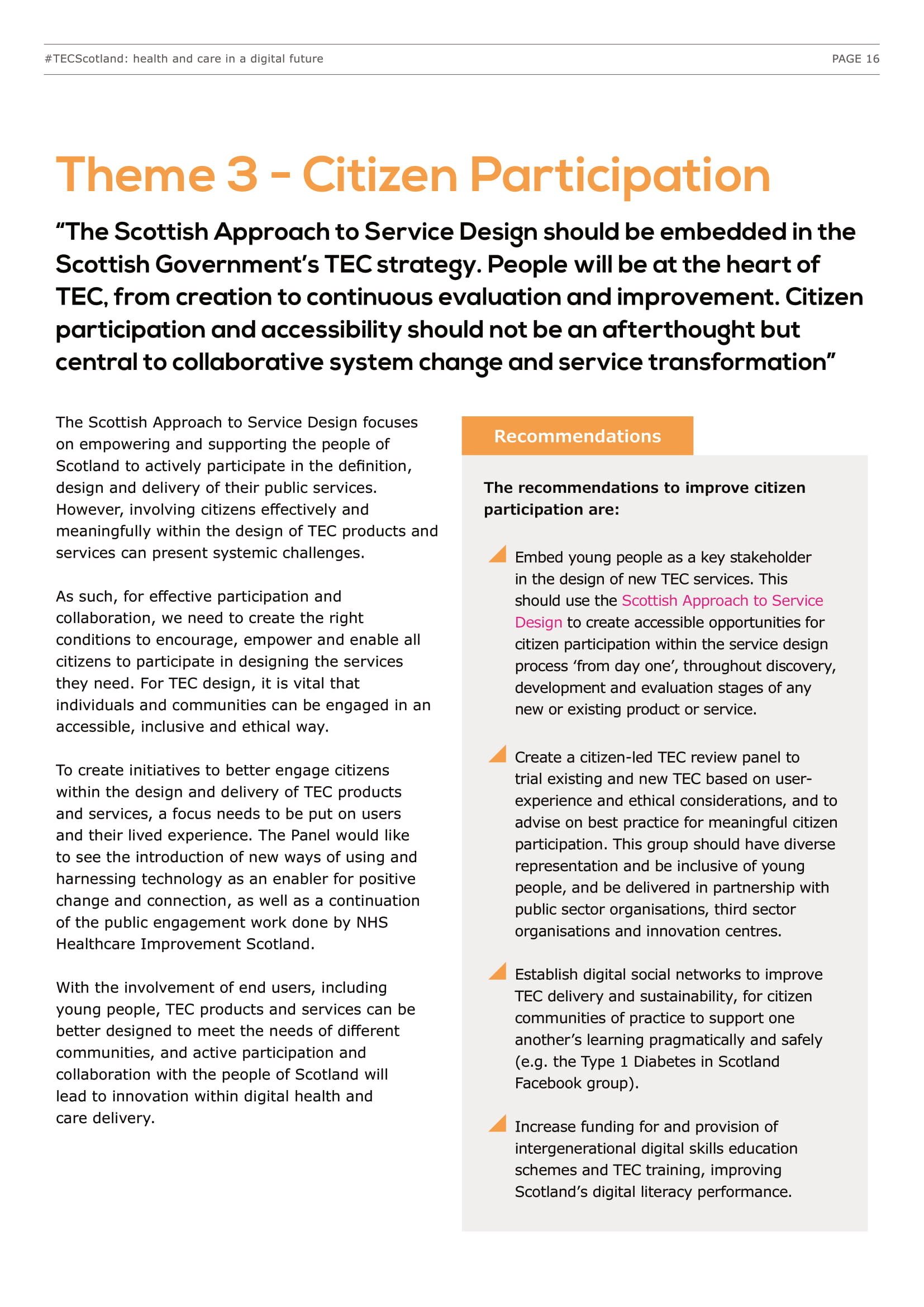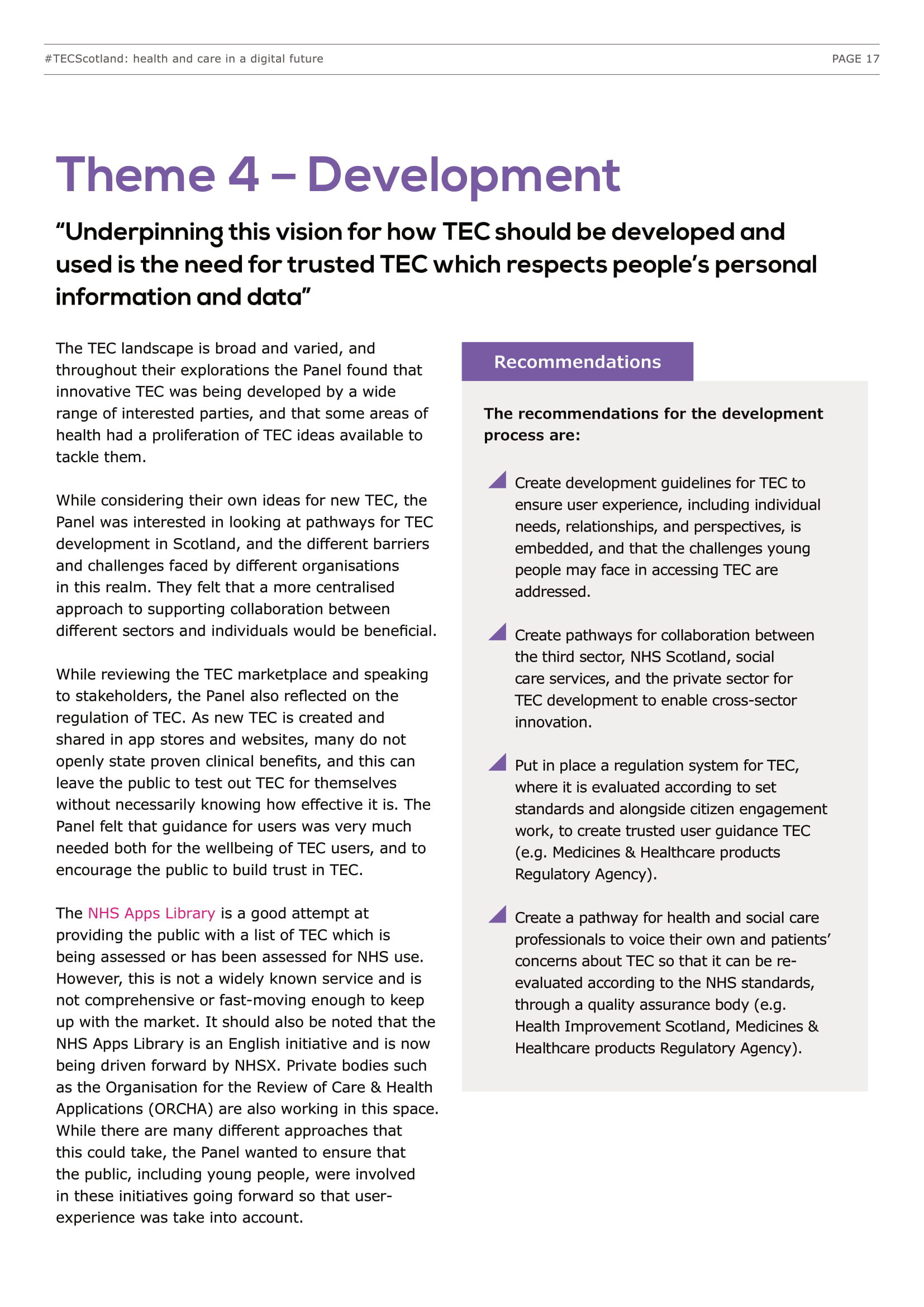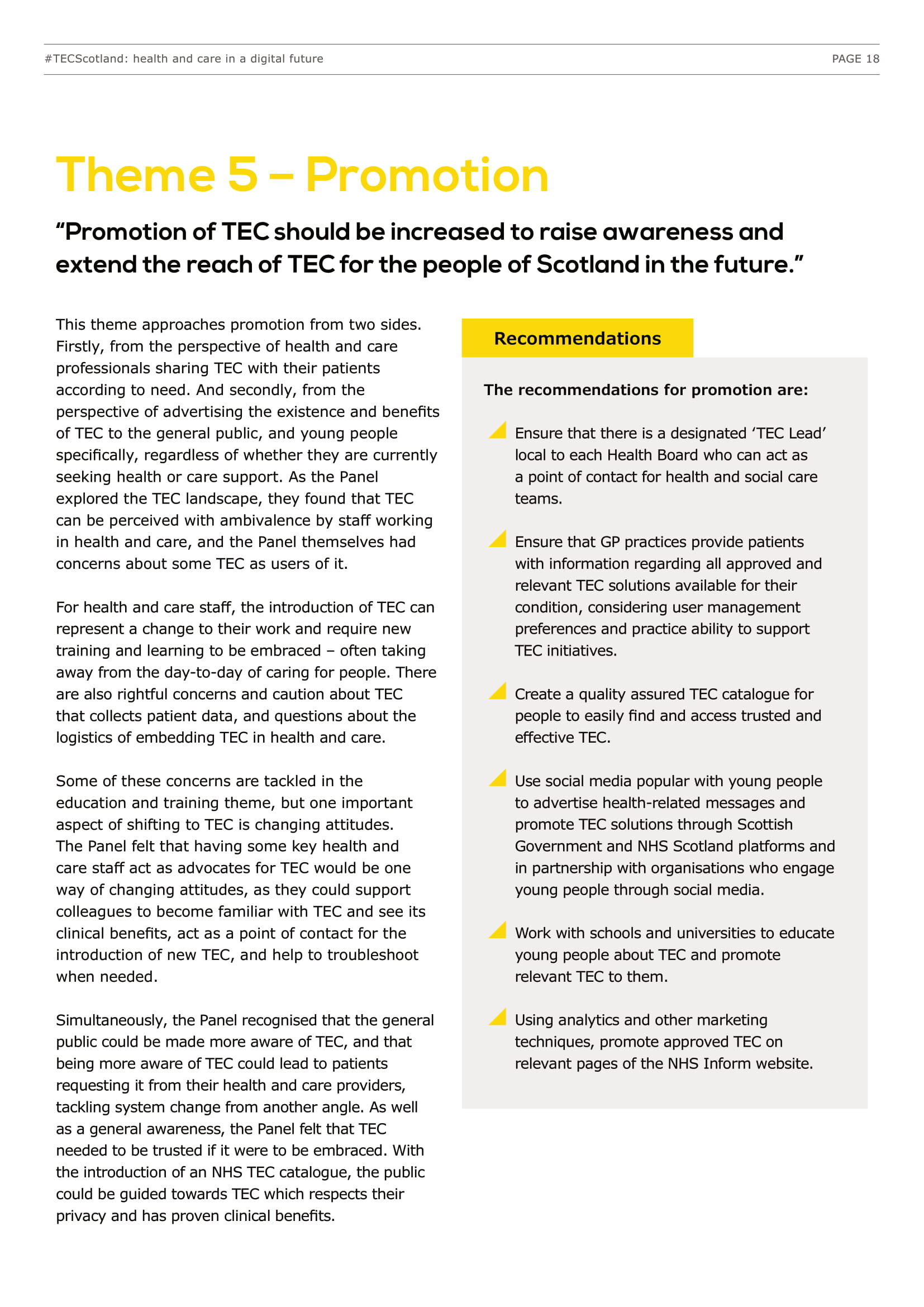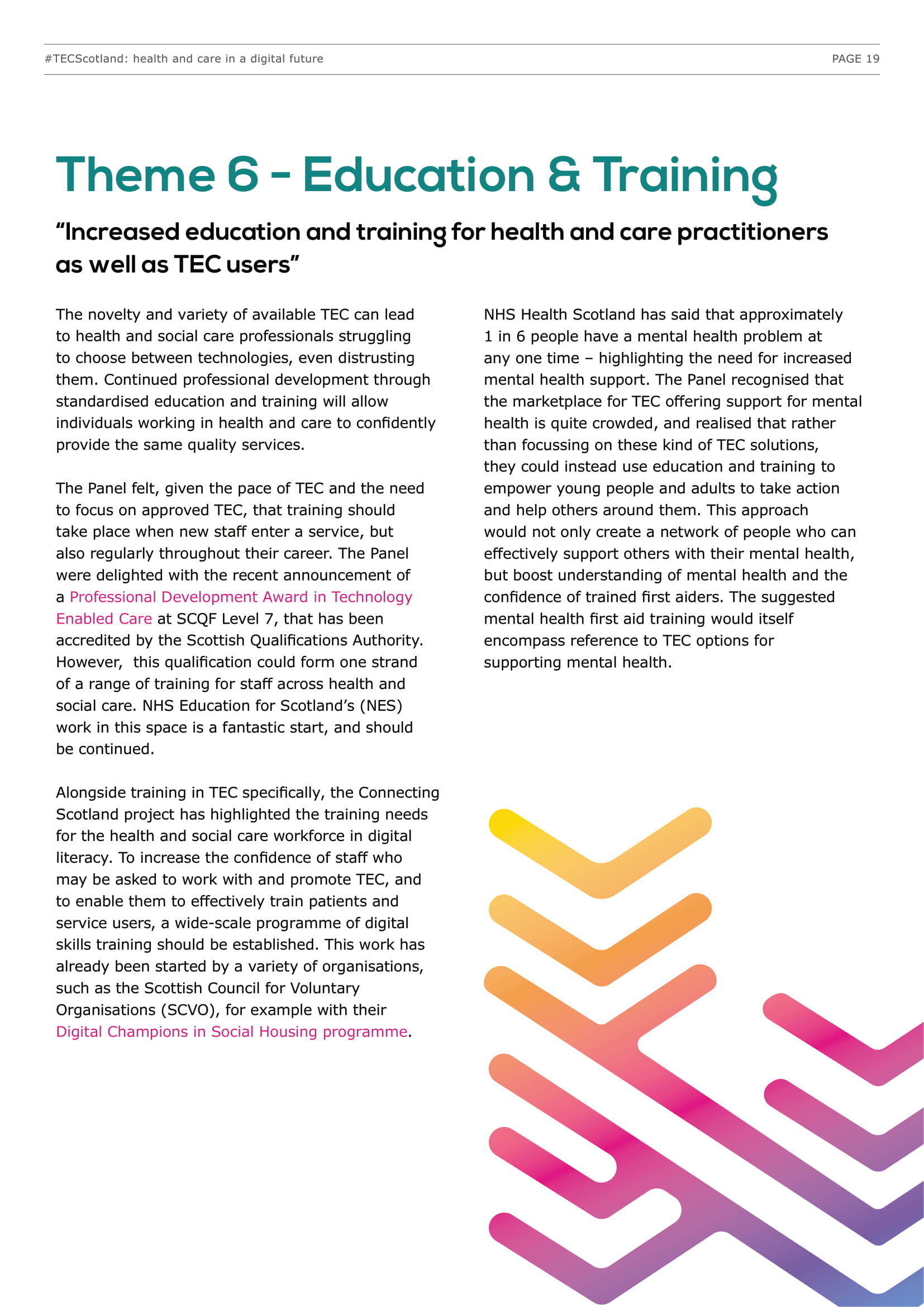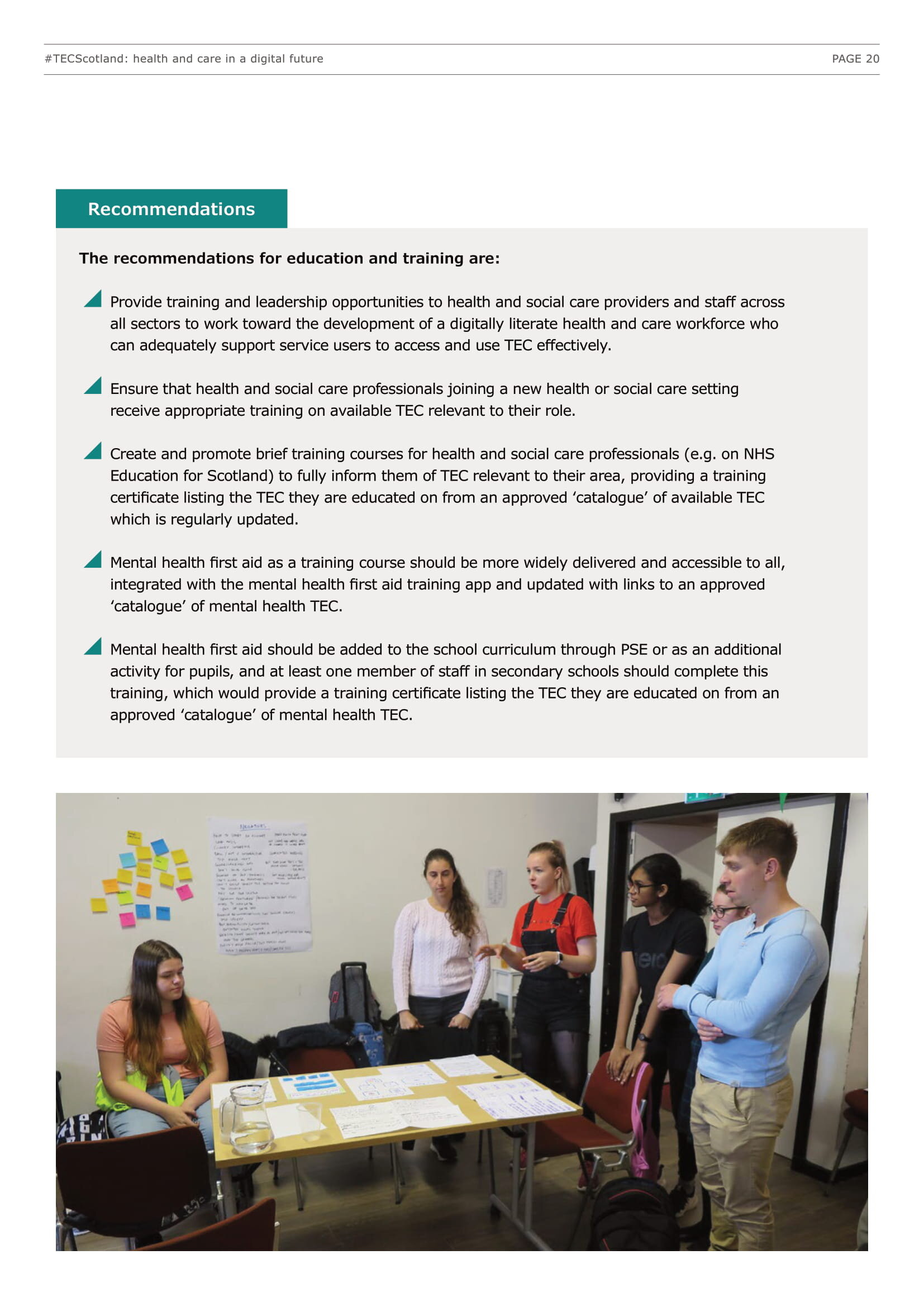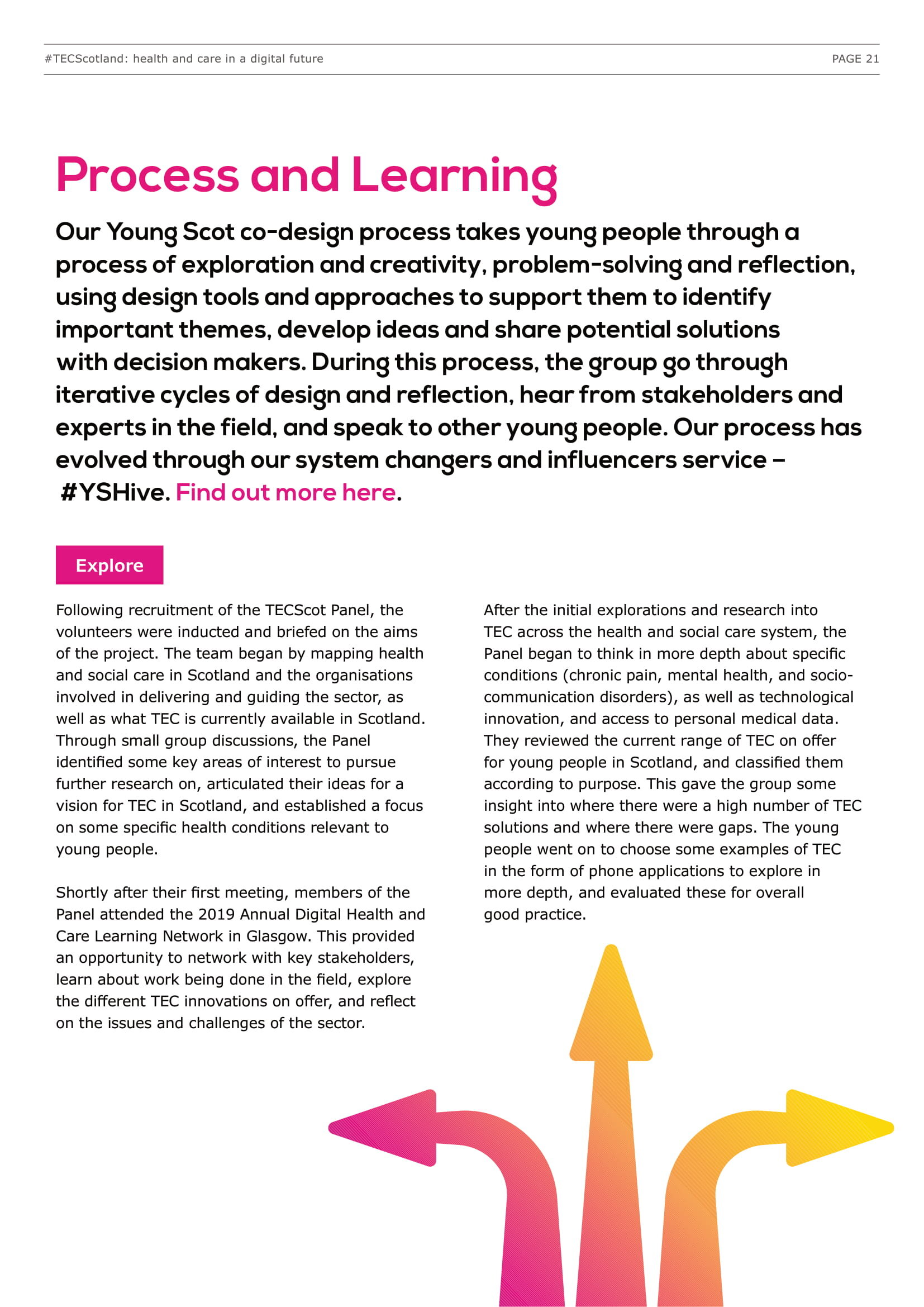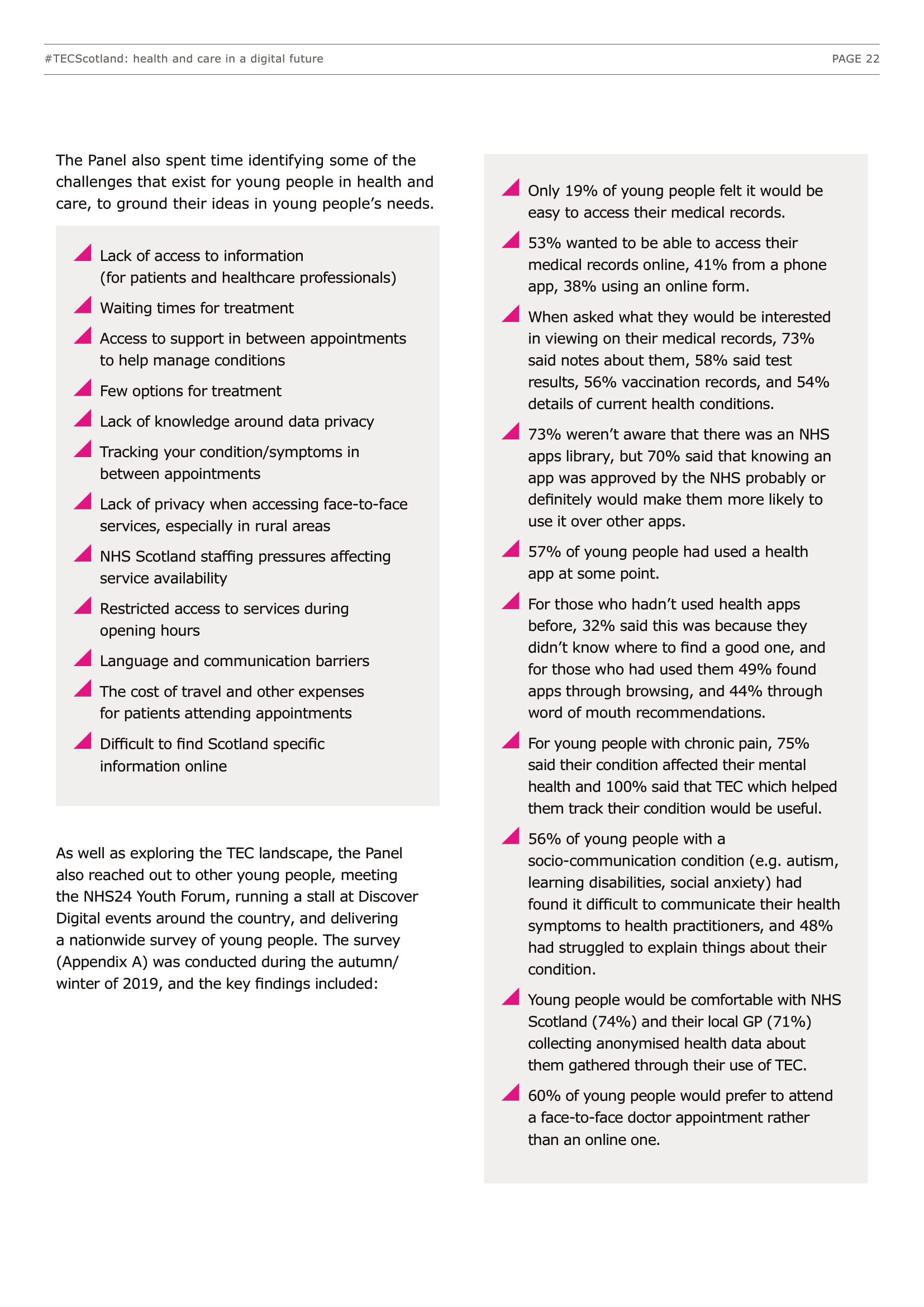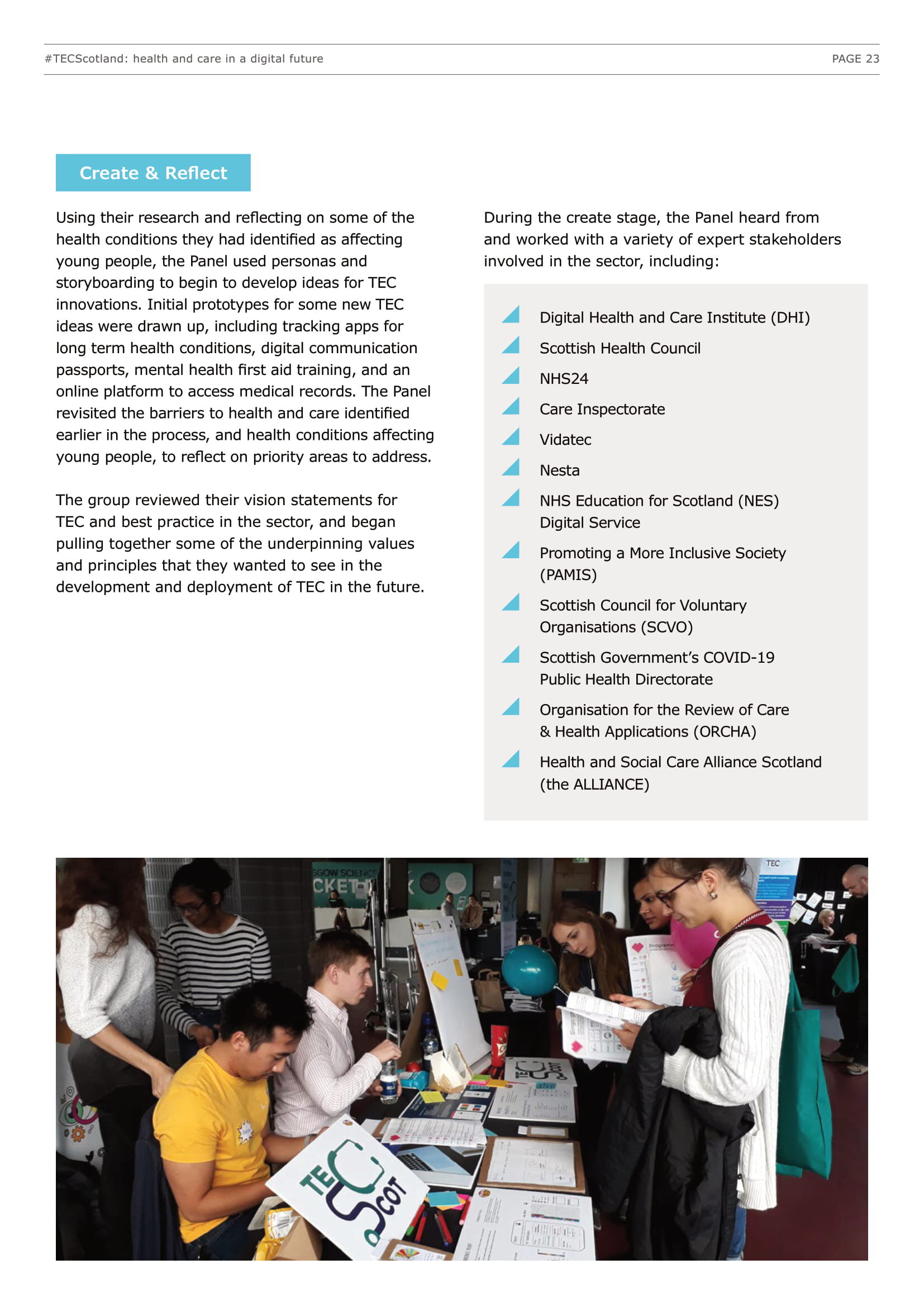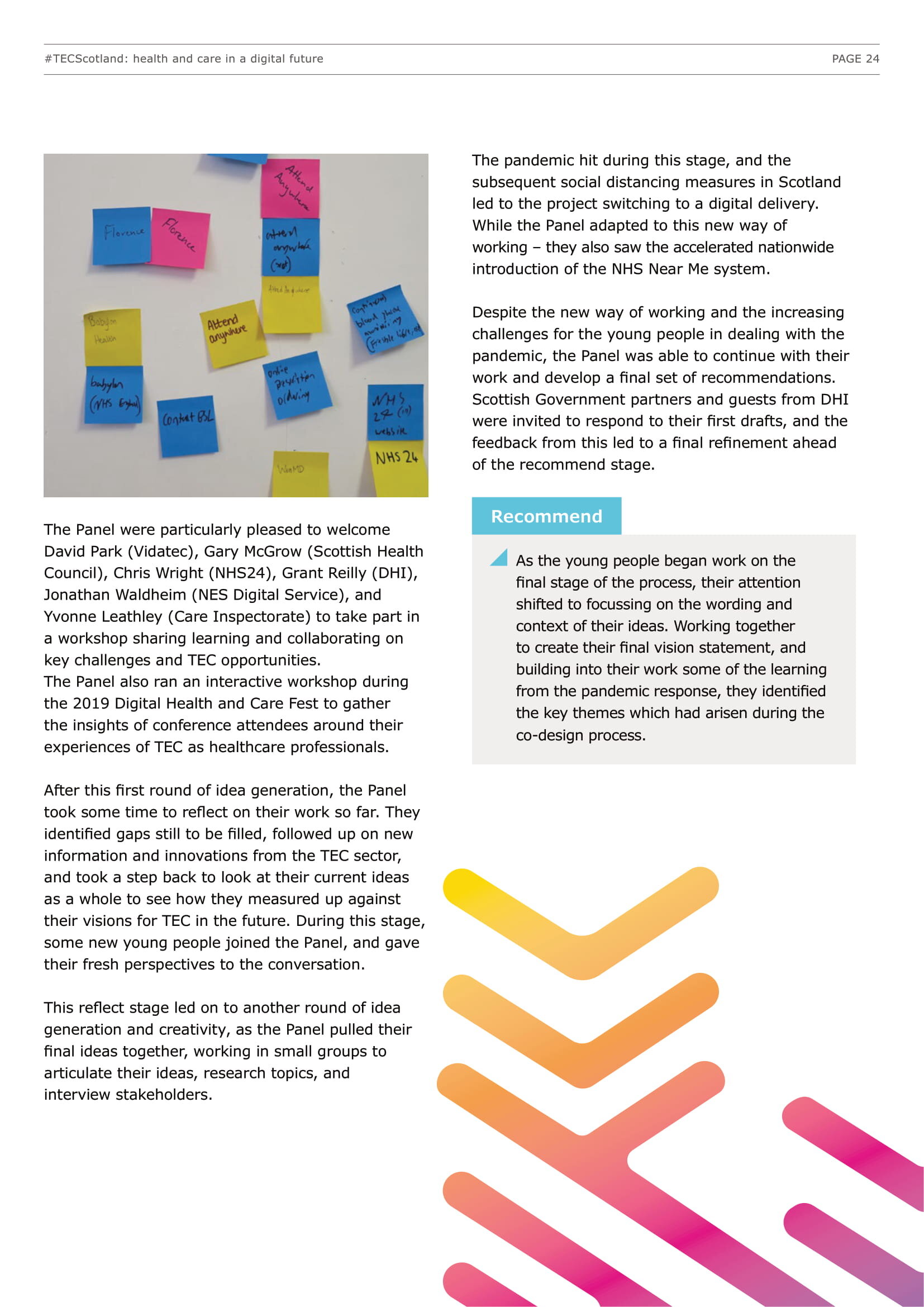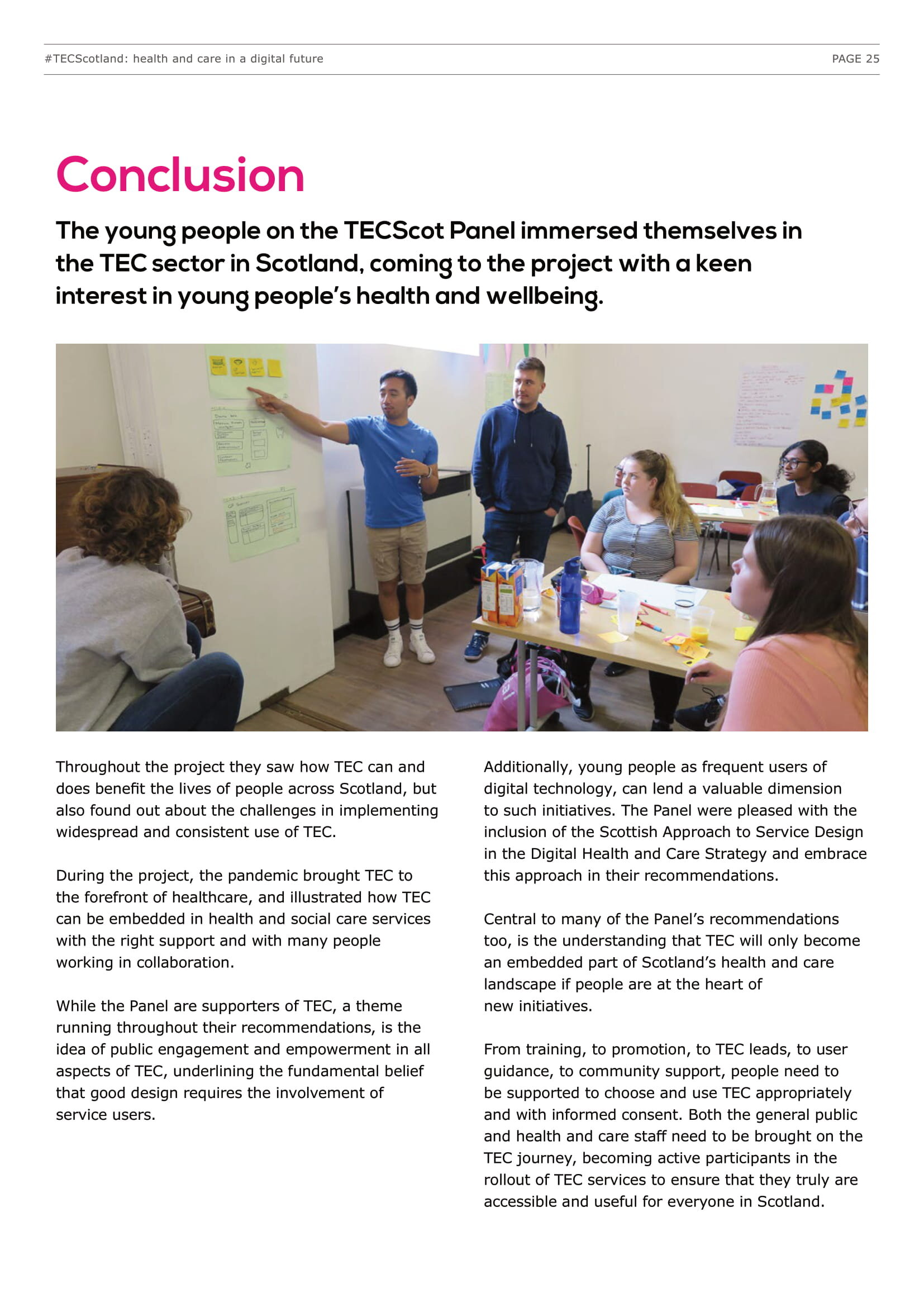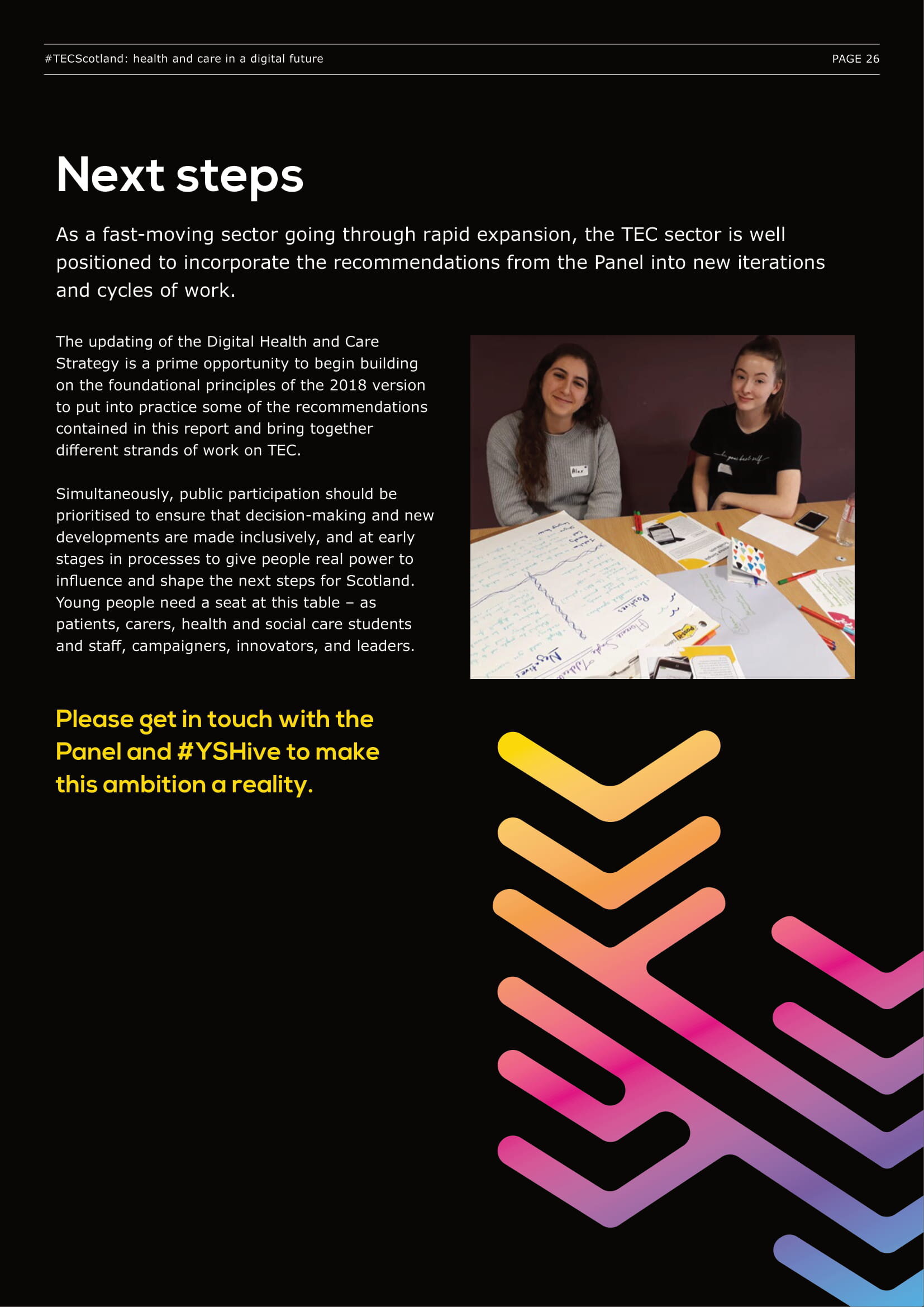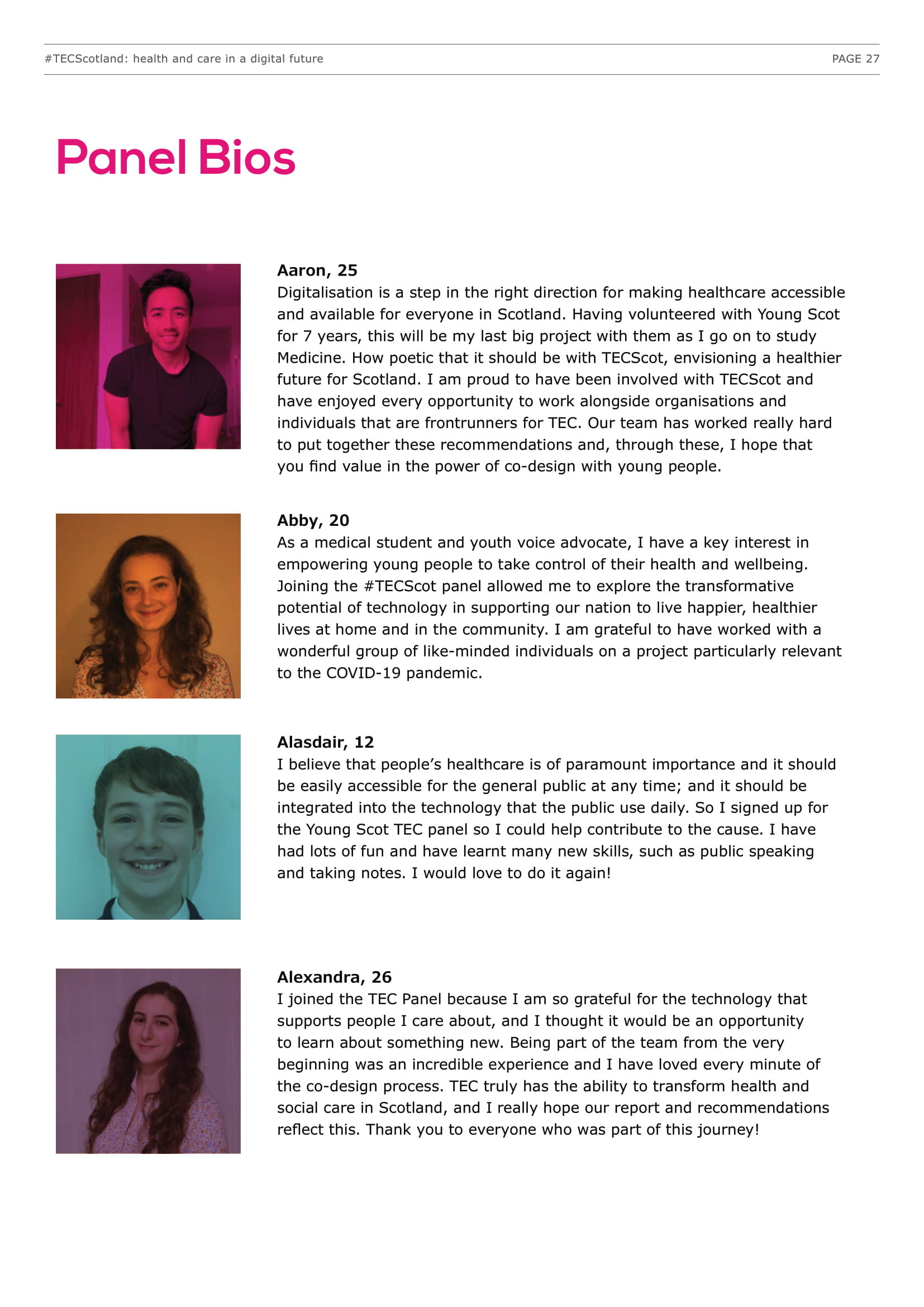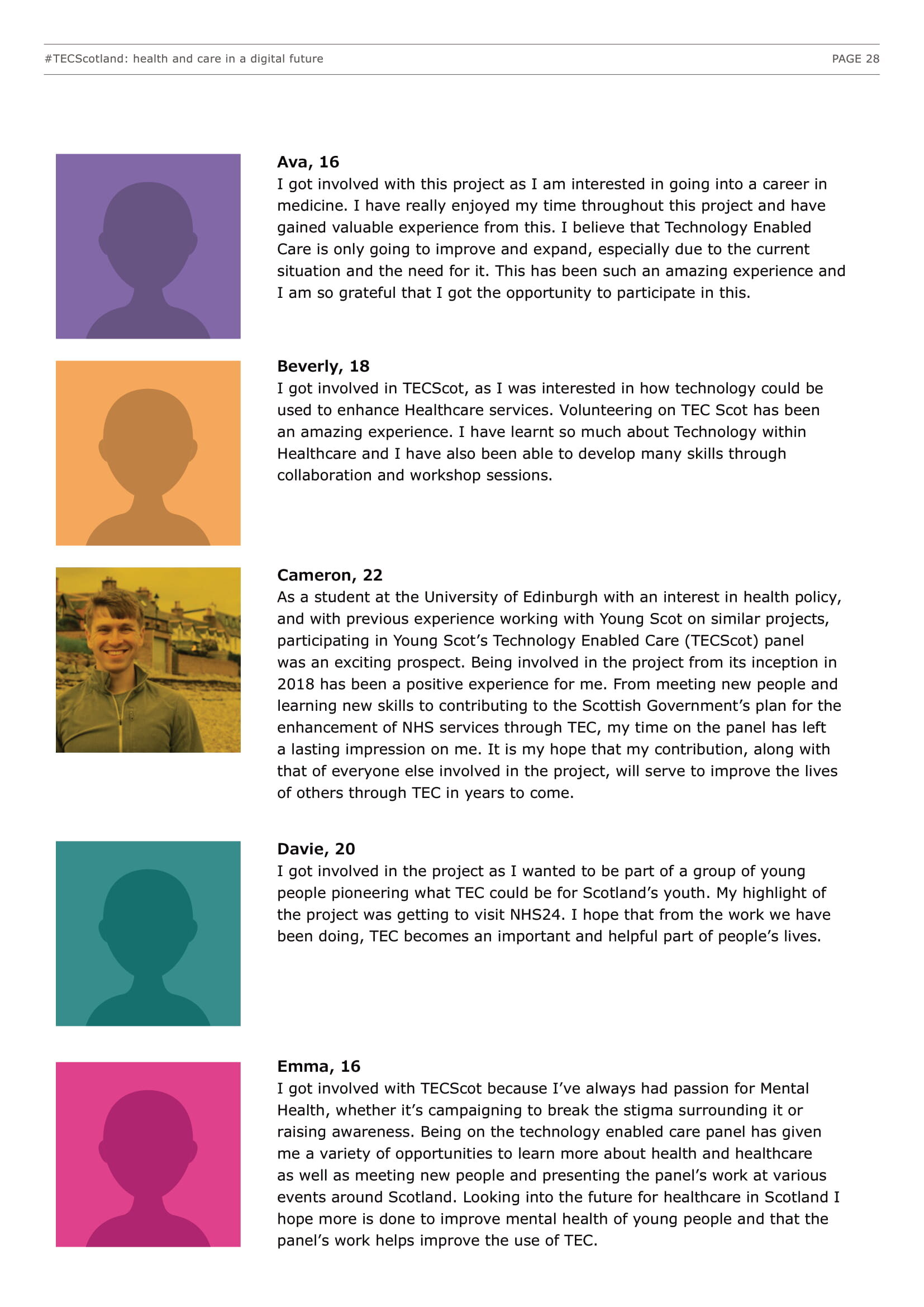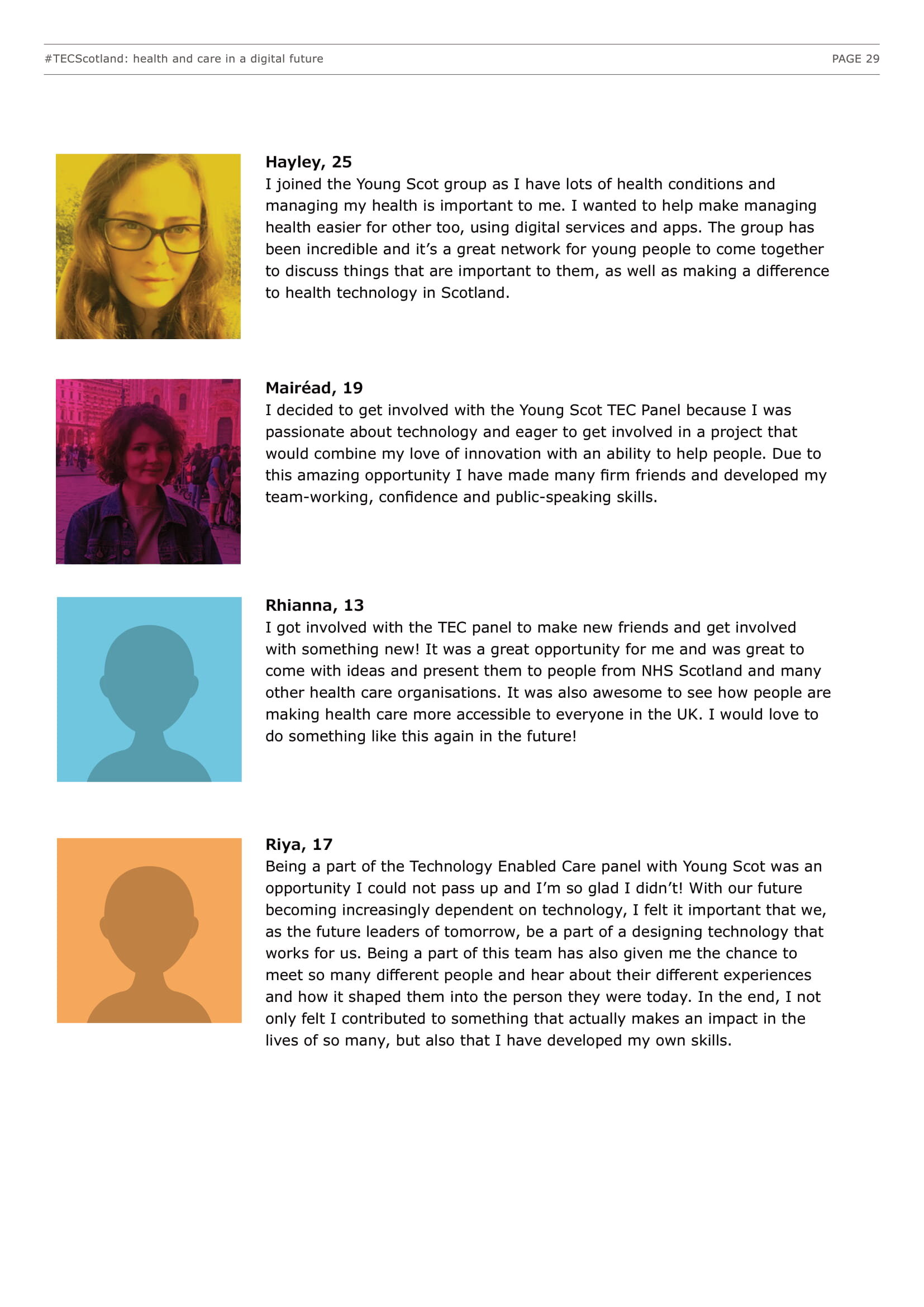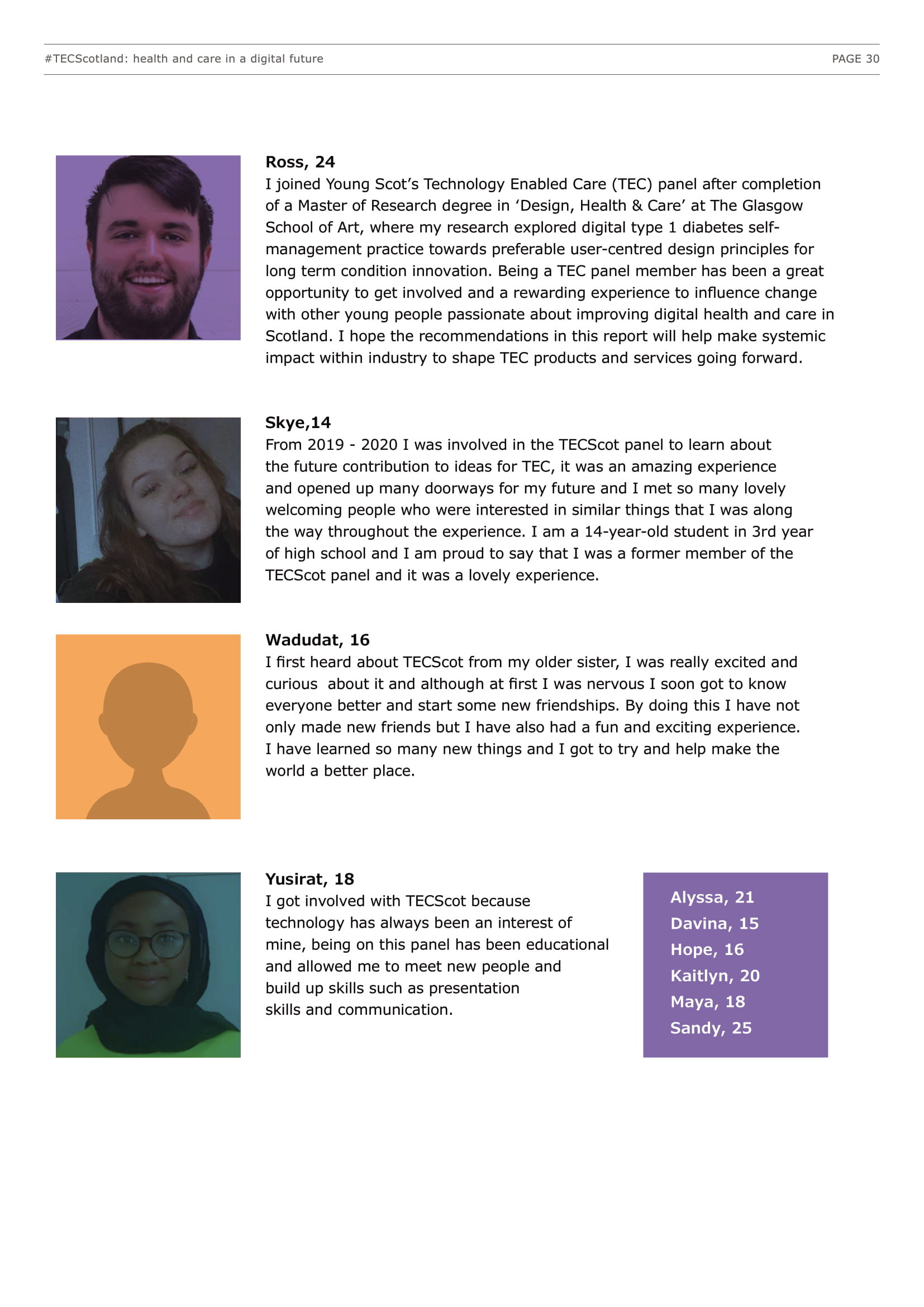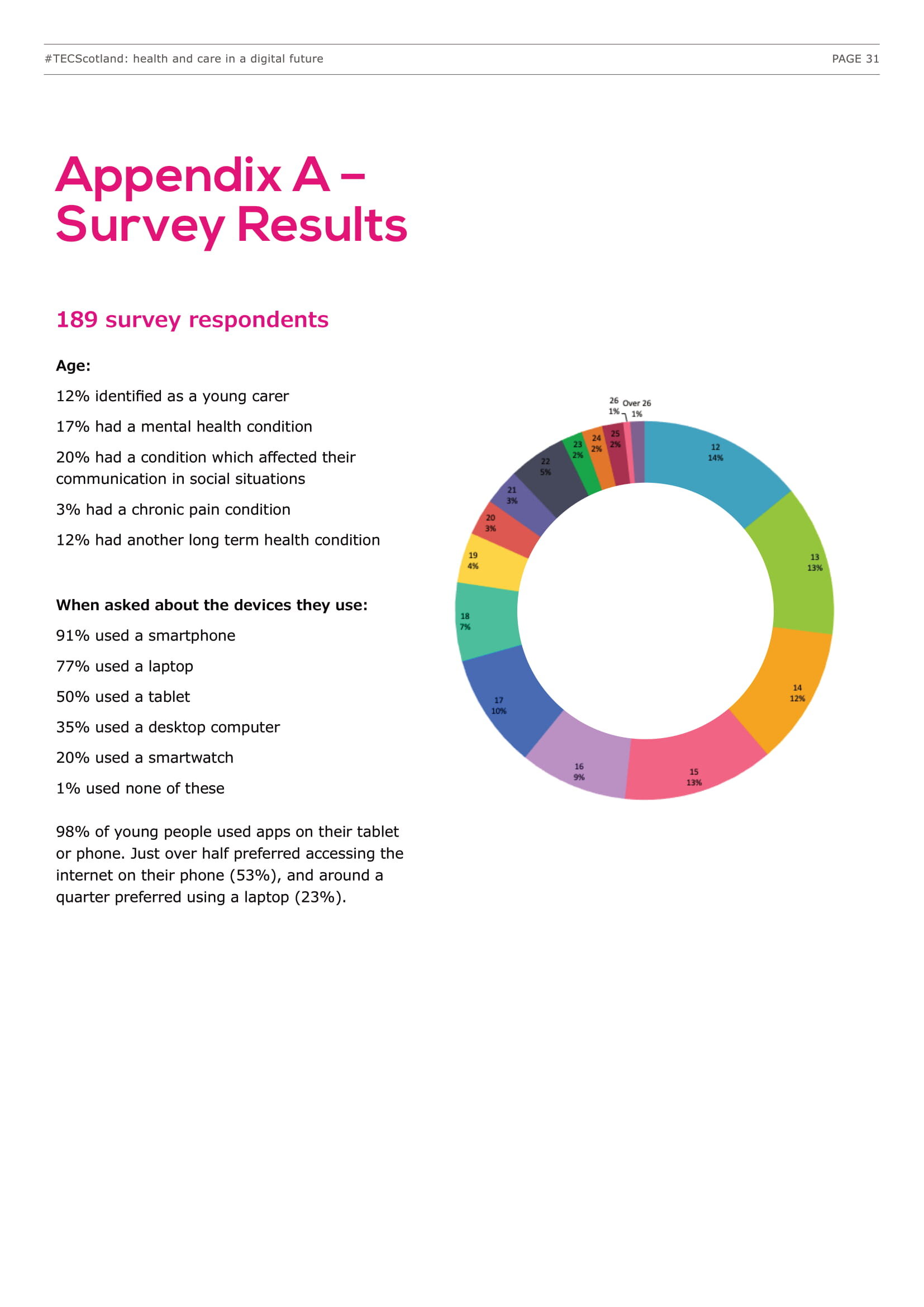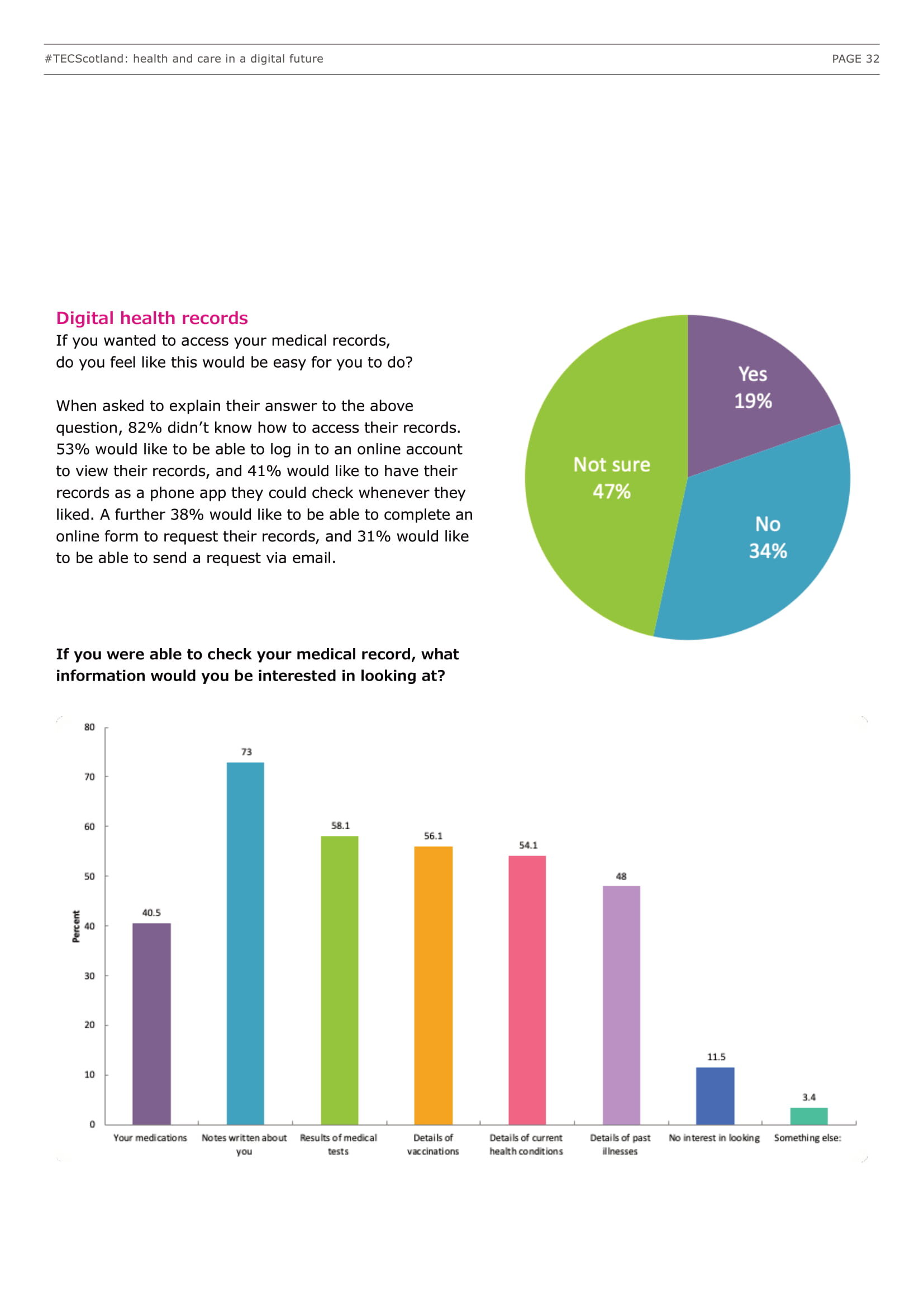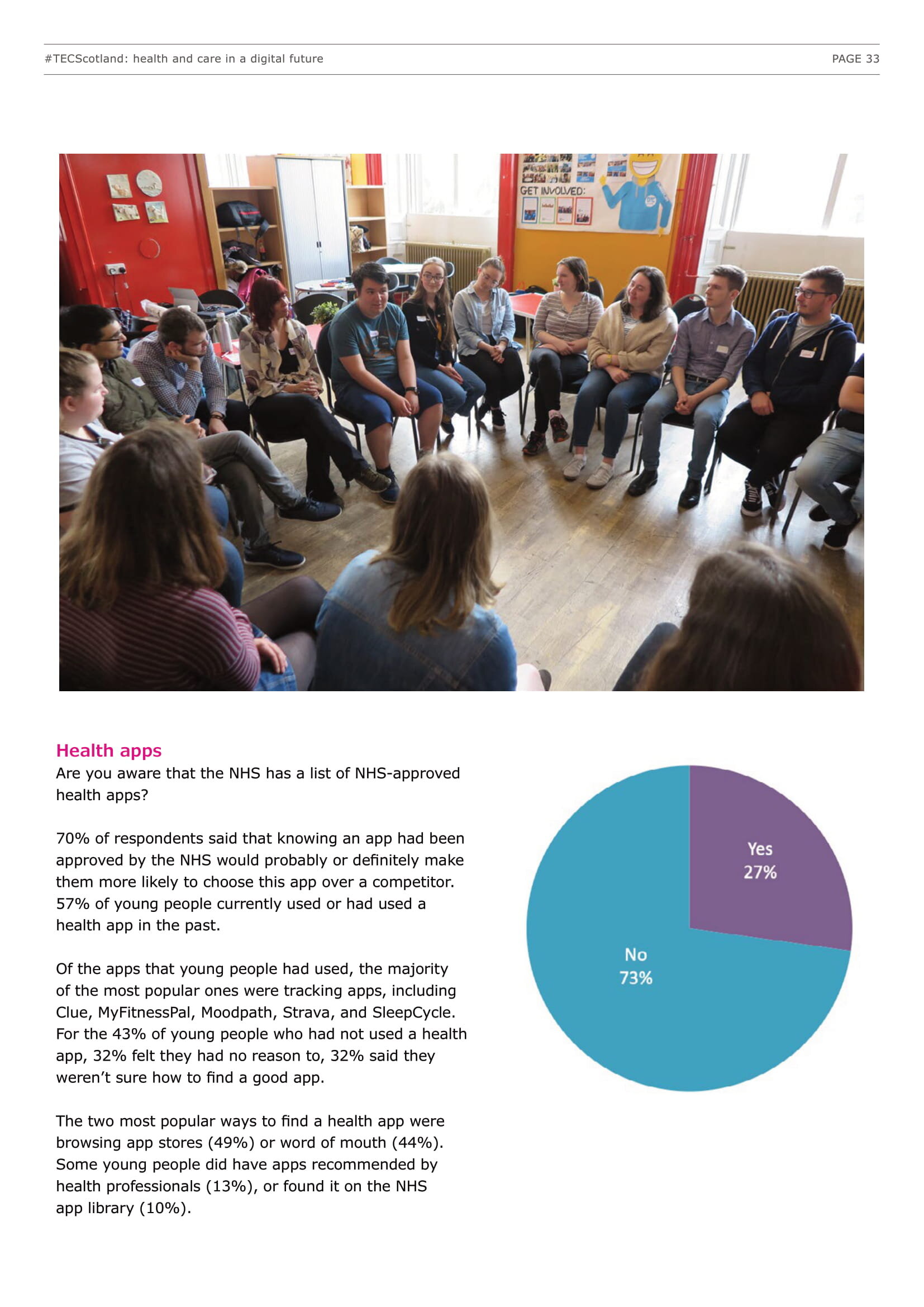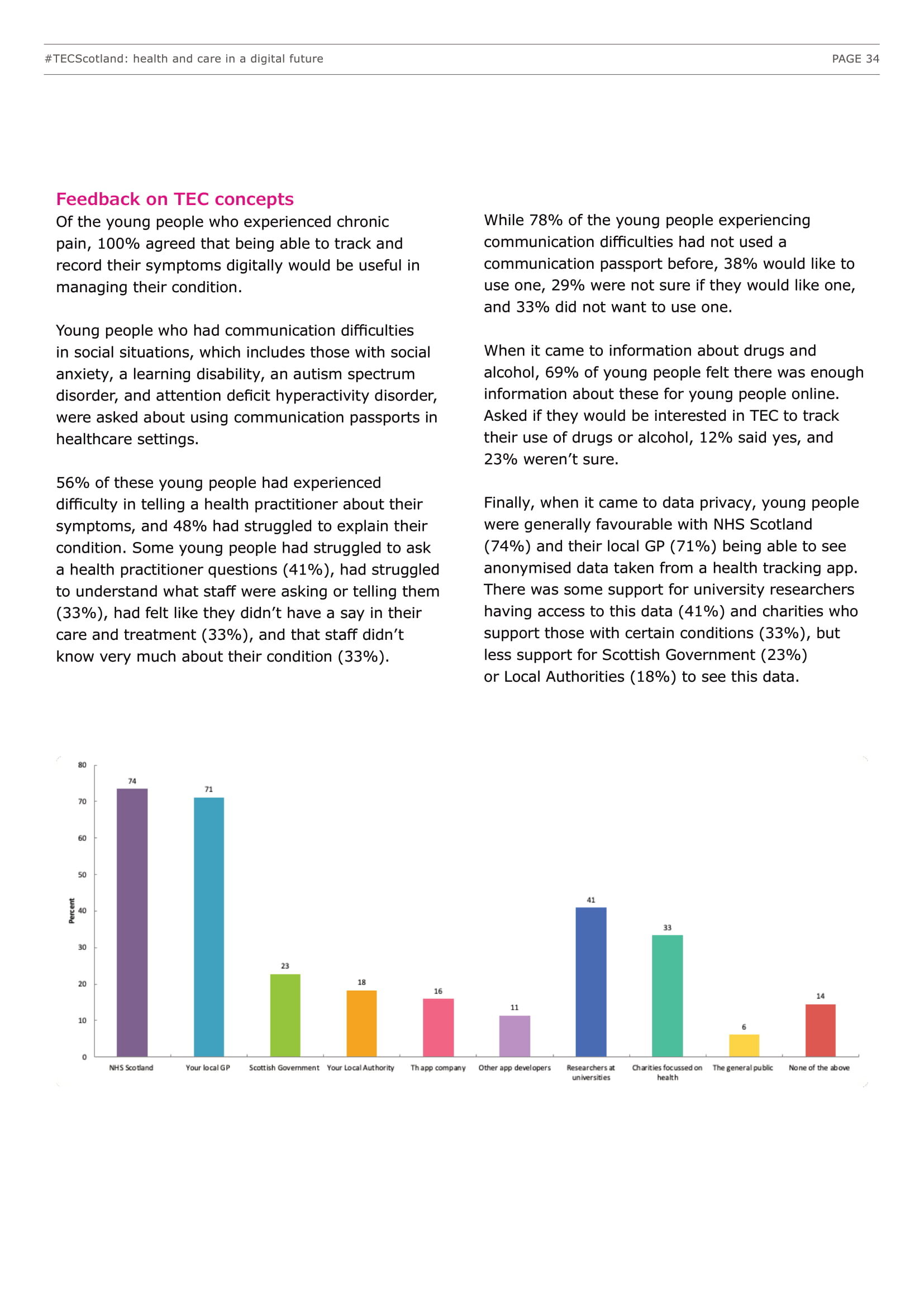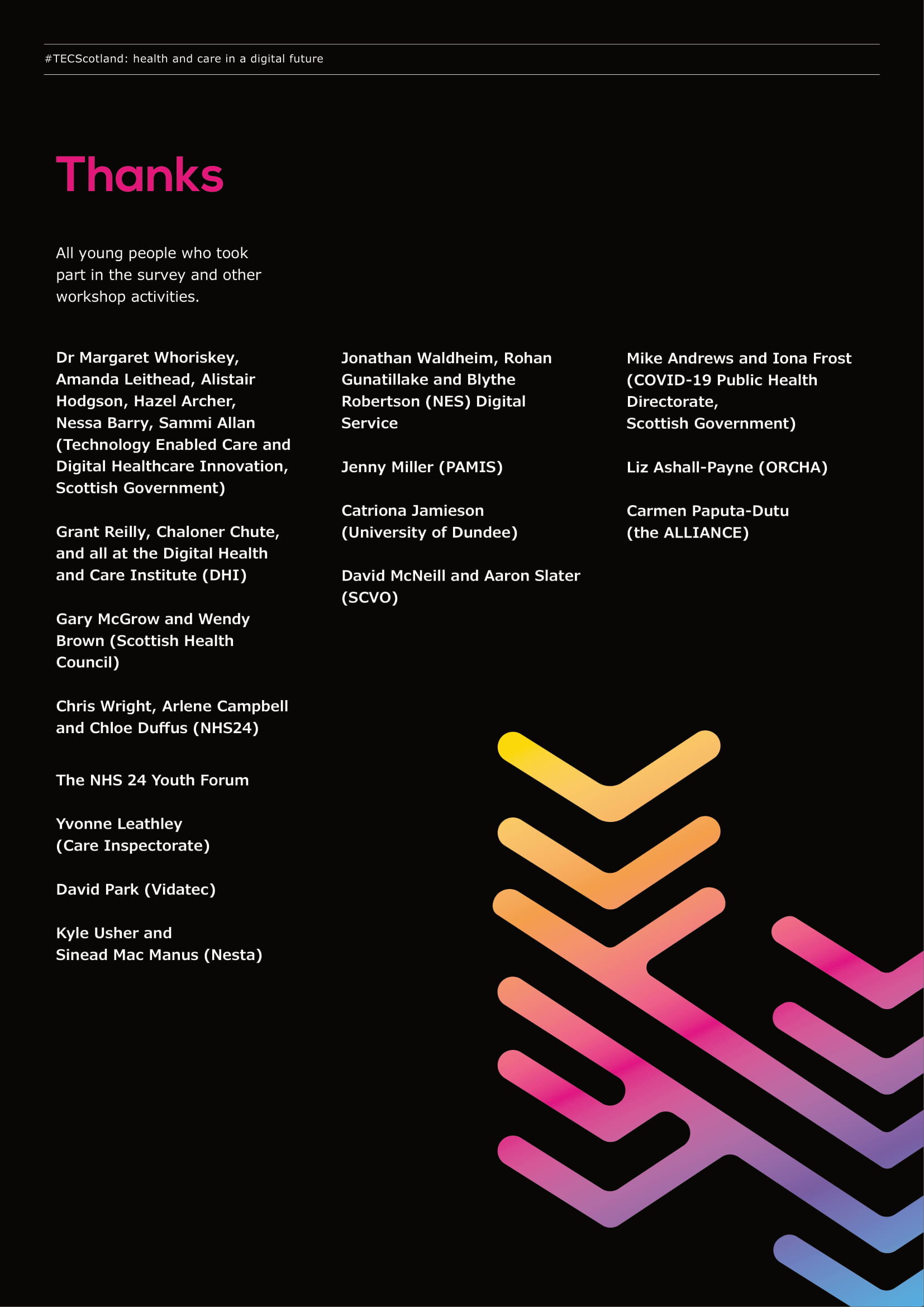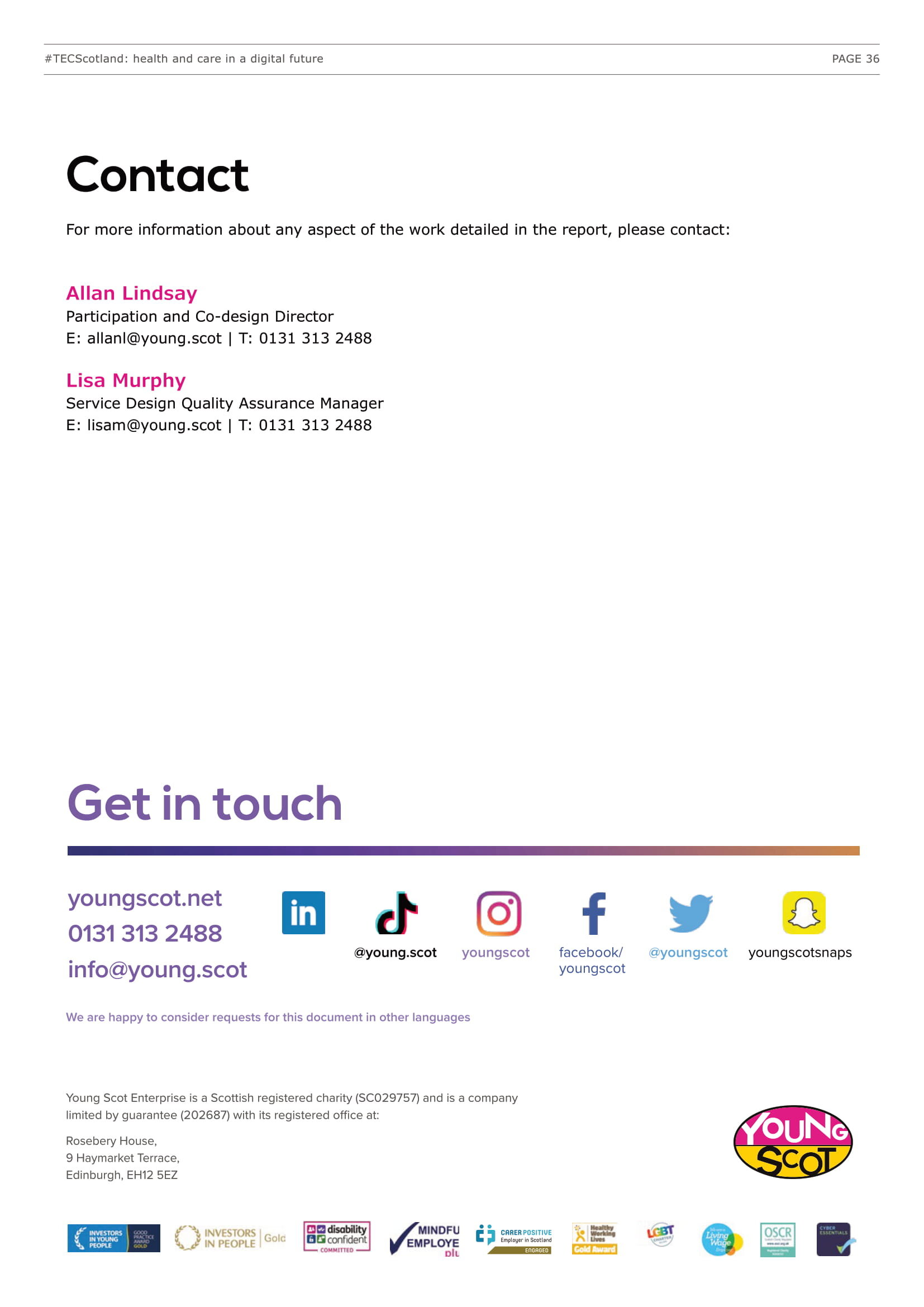#TECScotland: health and care in a digital future
In 2018, the Scottish Government’s Technology Enabled Care and Digital Healthcare Innovation Division worked with us on a short pilot project, exploring how digital technology could improve young people’s health and wellbeing. Following the success of this pilot, the Scottish Government partnered with us to establish a national Strategic Participation Panel.
The aim of the panel (named TECScot) was to bring young people from across Scotland together to look at how digital technology could improve young people’s health and wellbeing – and sustain and improve services for the future. As a generation who have grown up with digital technology, young people are well placed to adopt and integrate digital technology into the ways they access health and care services and information.
Against the backdrop of the COVID-19 pandemic, TECScot developed their final thoughts on the future of TEC in Scotland for young people.
You can scroll through a preview of our report below or download a full pdf version using the Download button.
Plain Text Version
#TECScotland: health and care in a digital future
Foreword from Scottish Government
As Head of Technology Enabled Care within the Scottish Government I am delighted to introduce this report.
As detailed in our Digital Health and Care Strategy:
“We wish to empower citizens to better manage their health and wellbeing, support independent living and gain access to services through digital means. We know this is leading to a shift in the balance of care by using the tools and technologies that we are already increasingly using for all other aspects of our lives”
We were keen to capture the views of young people on how Digital Technology can improve young people’s health and wellbeing. To achieve this, we partnered with Young Scot and a panel of young people to enable us to gain this valuable insight into what matters to them, their vision and recommendations.
This year has been incredibly challenging for us all, and in particular young people due to the impact of the global pandemic. The role of digital technology has never been so important in supporting health and care. Demand has been unprecedented and we have responded to this via an accelerated roll out of Technology Enabled Care within Scotland that includes expansion of Near Me Video conferencing to allow for remote consultations, digital mental health support and use of remote monitoring of health conditions.
I want to thank everyone who has been involved in the development of this excellent report and its recommendations. In particular, the commitment and talent of the panel of young people who came together to explore and respond to our request, giving up their free time to engage and continuing to do so throughout the pandemic. Your dedication and enthusiasm is greatly appreciated.
I am certain this resource will be of real benefit to the Scottish Government, in particular for the refresh of the Digital Health and Care Strategy taking place early next year. We will be reviewing the recommendations set out in this report and identifying what actions can put in place in response to these. I am committed to take account of the views and needs of children and young people as we further expand the use of technology.
I look forward to continuing to work in partnership with Young Scot to deliver this important and transformational agenda.
Dr Margaret Whoriskey
Head of Technology Enabled Care
Digital Health and Care Directorate
Foreword from Louise Macdonald
In 2020, we have seen the critical role that technology has to play in all our lives – especially TEC. The year has also shown us that it is vital for young people to be digitally connected in order to thrive. TEC has so much to offer all young people, and it is heartening to see the emphasis that young people in this report are placing on accessibility and citizen engagement.
The importance of embedding user-centred design is detailed in Scotland's Digital Health and Care Strategy (2018), and the #TECScot project, as well as the new Scottish Government Digital Citizen Board, represent fantastic steps for achieving this aim with young people at the heart.
Here at Young Scot, our digital information website and social media channels play their own role in TEC. This includes our up-to-date coronavirus information for young people, our new #AyeFeel emotional wellbeing resources, and our work connecting young people to health and wellbeing opportunities through our Young Scot National Entitlement Card and Young Scot Membership services.
I look forward to seeing how young people in Scotland further develop the use of TEC – for both their peers, families, loved ones and the entire population.
Louise Macdonald OBE, CEO, Young Scot
Background
Technology Enabled Care (TEC) has become a central part of health and care delivery in Scotland – as detailed in the Digital Health and Care Strategy (2018). It has also recently accelerated due to the COVID-19 pandemic response.
In 2018, the Scottish Government’s Technology Enabled Care and Digital Healthcare Innovation Division worked with us here at Young Scot on a short pilot project Insight: Technology Enabled Care. This explored how digital technology could improve young people’s health and wellbeing. As a generation who have grown up with digital technology, young people are well placed to adopt and integrate digital technology into the ways they access health and care services and information.
Following the success of this pilot, the Scottish Government partnered with us to establish a national Strategic Participation Panel. The aim of the panel was to bring young people from across Scotland together to look at how digital technology could improve young people’s health and wellbeing – and sustain and improve services for the future. The Strategic Participation Panel of 23 young people aged between 11-26 ran for 18 months during 2019-2020. The group of young people named themselves TECScot.
During the TECScot project, the COVID-19 pandemic had a significant effect on Scotland’s health and care systems, and social distancing measures resulted in an increased use of and reliance on TEC across the country. This is best illustrated by the use of the Near Me video consultation service. The service received a funding increase of £1,200,000 to scale-up coverage nationally. This resulted in huge increases in use (336 in the week before the scale‑up to almost 17,000 in the last week of June - Support for Video Appointments, Sept 2020, Scottish Government). Also, the Programme for Government 2020/2021 committed to a national approach to make Near Me the default option for consultations – demonstrating that Near Me has more than proved its value.
It was against this backdrop of the pandemic that TECScot developed their final thoughts on the future of TEC in Scotland for young people. Throughout the project the young people have been consistently impressed with the pace of change and the ambition outline in the Digital Health and Care Strategy, and hope that their recommendations for Scottish Government help to drive forward this change.
Introduction from TECScot Panel
TEC has the potential to empower people and put them at the heart of their health and care self-management. As such, the concept is embedded in Scottish Government’s Digital Health & Care Strategy (2018) and the NHS Scotland Route Map to the 2020 Vision for Health and Social Care. TEC allows us to be preventative and proactive in managing health, and Scotland should harness the potential of TEC for the benefit of all.
Since the beginning of the TECScot panel in the spring of 2019, there has been a rapid shift in the delivery of some aspects of TEC in Scotland due to the pandemic. NHS Near Me has been rolled out at a pace that could not been imagined at the beginning of the TECScot project. Other TEC products, such as computerised cognitive behavioural therapy (cCBT) and mental health support platforms, have benefitted from the increase in funding and structural support. We hope this investment will remain in place for years to come as TEC has demonstrated its value when Scotland needed it most.
In a world where we are more connected than ever before, but where individuals can still feel incredibly isolated, TEC can play an important role in supporting both our mental health and physical health. The challenges that have arisen due to the pandemic have made this even more evident. As young people enter the difficult economic and social aftermath of the pandemic, stress and anxiety level will be higher than ever. This highlights the need for mental health support for Scotland’s young people, and TEC has a valuable role to play in creating widely available and accessible mental health support on platforms tailored to young people.
As we look forward to new TEC being developed, and TEC becoming increasingly embedded in people’s lives, we feel it vital that decisions taken around the implementation of TEC in Scotland’s health and social care systems be co-designed with citizens. As such, embedding people of all backgrounds in the design of new services is essential.
According to Scotland’s Digital Strategy: Evidence Discussion Paper, 81% of citizens have basic digital literacy and 82% of adults use the internet for personal use. This demonstrates that citizen engagement is possible using digital platforms. Young people, who have grown up surrounded by technology are particularly well-suited to this task, and should be included in the conversation to design the services which affect or will affect them. However, these statistics also highlight that almost one fifth of people in Scotland do not have basic skills – and this must be tackled too.
We support the commitment outlined in the Digital Health & Care Strategy (2018) for a clear national approach to supporting local co-designed service transformation – using the Scottish Approach to Service Design as a foundation for this work.
We are also keenly aware of the digital divide and the difficulty that some in society, including large numbers of young people, have in getting online and navigating the digital world. Again, the pandemic has highlighted this divide more sharply than ever before, and the Connecting Scotland initiative has been a welcome example of the work that needs to underpin the rollout of TEC across the country to ensure that everyone can access it.
Education is also a key factor in the success of TEC, and supporting individuals to find and access TEC that works for them should be promoted in every way possible by Scottish Government, in schools, workplaces and communities. Professionals working in health and care have a huge role to play in connecting people with appropriate TEC, but we know that many young people use TEC as they seek their own solutions to their health needs. Information and guidance for those approaching TEC as independent users to manage their own health should also be a priority.
In addition to education and support, individuals should be empowered to have easy access to and control over their healthcare data. Establishing trust in TEC, especially concerning the protection of personal data and who has access to it, will require the implementation of robust security systems and communication of these protections to the public. The 5Rights Foundation provides an excellent starting point to consider the needs of young people in designing services with young people’s rights and privacy in mind – making sure TEC is inclusive from the start.
TECScot Panel Vision Statement
Our vision for TEC in Scotland is for a digital health system integrated into and complementing current health and care services. It should ensure that people are empowered to choose and use digital or face-to-face channels of communication and engagement for their health and care.
TEC must be easy to access, inclusive and user-friendly, particularly for those experiencing additional barriers to engaging in digital health services. Also, the Scottish Approach to Service Design should be embedded in the Scottish Government’s TEC strategy. People will be at the heart of TEC, from creation to continuous evaluation and improvement. Citizen participation and accessibility should not be an afterthought – but central to collaborative system change and service transformation.
TEC in Scotland should support self-management and aim to anticipate deterioration in health conditions early to pre-empt emergency primary care admissions. TEC should provide avenues for early intervention within home and community settings, helping people identify and respond to their health and care needs in an effective and meaningful way. This should help reduce the need for urgent or critical care. Mental and physical health conditions should be treated with parity when planning, funding, developing and implementing TEC.
Underpinning this vision for how TEC should be developed and used is the need for trusted TEC which respects people’s personal information and data, and increased education and training for health and care practitioners as well as TEC users. Promotion of TEC should be increased to raise awareness and extend the reach of TEC for the people of Scotland in the future.
Digital Health and Care Strategy
The Scottish Government’s Digital Health and Care Strategy has been a foundational document for TECScot, and the six key domains in this strategy have links to the themes we identified. This is highlighted in each of the thematic areas in the next section, but for reference recommendations related to each of the six domains are represented in the themes summarised here:
National Direction - Access, Citizen Participation, Development
Information governance, assurance and cyber security – Diversify Digital Services, Development, Promotion
Service transformation – Citizen Participation, Development
Workforce capability – Education and Training
National digital platform – Access, Diversify Digital Services
Transition process – Access, Citizen Participation, Development
Theme 1 – Access
“TEC must be easy to access, inclusive and user-friendly, particularly for those experiencing additional barriers to engaging in digital health services”
For many people across Scotland, TEC has not been presented as an option to them for various reasons, including funding and infrastructure, but also due to the slow rollout of different TEC. One example being the introduction of video conferencing appointments using Near Me, that was pioneered by NHS Highland, but prior to the pandemic was not widely available in other areas. The Panel would like to see TEC of good quality introduced more quickly across the country to make it accessible for as many people as possible.
Side-by-side with increasing the availability of TEC, is the need to ensure that it is accessible for people with additional barriers to access, such as English as an additional language, poor digital connectedness, or a disability. Some barriers to accessing TEC may affect young people more than others, such as having family-owned instead of personal devices, less privacy or access to private space, and less control over some of their circumstances.
Secondly, access to TEC needs to be balanced with access to health and care services. TEC needs to be provided in addition to and complementing existing face-to-face services so that people who need to engage with a practitioner in person can still do so. TEC can even help to facilitate this face-to-face contact, and face-to-face contact can facilitate the use of TEC.
Making TEC more widely available also requires support and training for the staff who will manage and monitor TEC, as well as the funding and infrastructure to bring equipment to health and care centres across the country.
The recommendations to improve access are:
Ensure that users are informed about and empowered to use TEC to meet their needs as appropriate
Ensure that TEC is more quickly accessible to all who need it, particularly those with additional barriers to access.
Build on the work of Connecting Scotland to improve the digital infrastructure and support young people to access and utilise digital devices and TEC, with expert advice for young people, care providers, social workers and carers.
Ensure that all health care centres and remote consultation spaces are provided with up-to-date equipment and all staff are trained and supported to use TEC to its fullest potential.
Create a service, or build on existing services, that helps people make informed decisions about when to use TEC, including remote monitoring devices, within home and community settings, and when to reach out for day-to-day or urgent care.
Theme 2 – Diversify Digital Services
“TEC in Scotland should support self-management, provide avenues for early intervention within home and community settings, helping people identify and respond to their health and care need. Mental and physical health conditions should be treated with parity”
Throughout the TECScot project, the Panel have been constantly thinking about how TEC could develop to better serve Scotland’s young people, and the population in general. From tackling specific health conditions, to looking at health data and communication, the Panel has thought in depth about which TEC to focus on.
The Panel was impressed with the Near Me video conferencing platform early on in the project, and an early recommendation to see it rolled out nationwide has been achieved in the life cycle of the project. Along with continuing with this successful nationwide introduction, bringing the convenience and ease of taking a call to health appointments, the Panel has also highlighted online mental health services which they would like to see continuing to increase in future.
Other recommendations for specific aspects of TEC are focussed on providing young people with information and technology to help manage their own health conditions. The NHS Inform library of self-help guides is an example held up by the Panel as a way to support users to become active in managing their conditions. However, there was also an interest in empowering young people to work with their doctors to share monitoring information and notes about their lived experiences of health conditions.
Some of the following recommendations focus on specific health conditions or barriers to health and care that young people may experience, and these have been made after careful review of the current market. One case study to illustrate the What to Expect concept is highlighted here, but some other good examples of multimedia practice are The Chalmers Centre Gender Identity Clinic video from NHS Lothian, and the range of videos available on the Near Me website.
Collected here are also some of the prototype ideas for the look, feel and functionality of some of the TEC ideas put forward by the young people.
The recommendations to diversify digital services for young people are:
Create a digital medical health account for every person in Scotland, that is easy to sign-up for and can be used to access medical records (including vaccinations, notes from clinicians, current medications) and information on how to interpret medical information. Give patients shared control over who can access their account and view their medical records.
Allow patients to contribute notes about their experiences with their health and health monitoring data obtained through TEC to their digital medical health account through, for example, linked apps and an online portal. This will provide more information to healthcare professionals, enable more accuracy in monitoring conditions, and empower people to become partners in their healthcare planning.
Work with developers to produce or adapt a range of TEC to suit different health conditions and users’ needs, that connect to and share data with digital medical health accounts.
Develop and promote a series of What to Expect guides for health services on multimedia platforms – designed to prepare young people to access the service and get the most out of appointments.
Continue to roll out the NHS Near Me video calling platform and NHS Inform digital self-help guides.
Continue to roll out internet based and computerised cognitive behavioural therapy (iCBT/cCBT) supported solutions and other digital mental health interventions.
Develop an NHS Scotland Mental Health First Aid app to be available across interfaces which includes downloadable content and functions offline.
Expand electronic prescription services across Scotland to enable paperless prescriptions end-to-end, including repeat prescription request systems that minimise human error.
Digitise NHS helplines – providing chat-based options to maximise user choice, control and empowerment.
Develop an interactive digital platform for young people to access information and support to help manage exam stress (e.g. Young Scot’s digital information platform young.scot).
Introduce a universal digital ‘Personally Held Health Record’ resource (like the Promoting a More Inclusive Society [PAMIS] communication passport) to allow users to ‘tell their story once’ in their own words so they don’t have to continuously repeat their story to health and social care providers.
Support the development of and fund apps that help people to monitor or reduce substance use, including drugs, alcohol, and smoking, and support recovery, wellbeing, and sobriety (for example through calculating the units in different drinks, and gamification).
Case study – What to Expect Guide
Young people increasingly look for information about healthcare services online, but may struggle to find content that addresses the questions they have ahead of interacting with these services. With this in mind, a ‘What to Expect Guide’ could be developed for young people looking to access a range of different services. Being equipped with this information before accessing a service can reduce anxiety and worry, help young people navigate services more effectively, and support young people to engage with services they may not have accessed otherwise.
‘What to Expect Guides’ could be in different formats, although efforts should be made toward multimedia information rather than just text. If text is used it should be brief and to the point, and written with young people in mind. Videos can be particularly useful in providing information to young people who would otherwise struggle to read lots of text, and have the benefit of showing young people spaces and equipment they might encounter.
‘What to Expect Guides’ could be hosted by Young Scot and developed in partnership with NHS Boards and Scottish Government.
Some services or topics which might benefit in particular from a ‘What to Expect Guide’ are
· Immunisations
· Attending accident and emergency
· Making and attending a GP appointment
· Accessing Child and Adolescent Mental Health services
· Accessing sexual health services
· Accessing Gender Identity Clinics
· Using helplines
The content included here as a case study is from the young.scot platform and is taking young people through ‘What to Expect from a COVID-19 test’. This case study includes a mixture of text and video information for young people to access. The information for this article was taken from interviews with the Scottish Government’s Test and Protect team, and has been quality assured by Young Scot’s Digital Information Team.
Case study – Mental Health First Aid app
The market for mental health TEC is quite a busy one, and along with clinically assessed TEC interventions such as computerised cognitive behavioural therapy (cCBT) and self-help guides, are providing young people with many options to access mental health support digitally. One gap in this market however is in empowering young people to support their friends and family through periods of poor mental health. Friends and family can often be the first place young people go to seek support for their mental health, and being trained to deal with this situation as a mental health first aider would help young people to respond to these situations with confidence.
Public Health Scotland currently run Scotland’s Mental Health First Aid courses around the country which means there is an established body of teaching and learning content that an app could draw from. The benefits of an app over a face-to-face training course are increased accessibility for more people, learning at your own pace and direction, and having a ‘quick reference’ guide to hand when you need it.
There is great value in face-to-face training, which is why Mental Health First Aid should be delivered in schools and workplaces nationally, however while this is being established an app could provide a valuable tool for young people who are already supporting each others’ mental wellbeing informally. Furthermore, an app could act as a complementary tool when delivered alongside a face-to-face course.
Case study – Personally Held Health Record
Young people with socio-communication difficulties, such as those with learning disabilities, autism, or social anxiety, can often struggle to communicate effectively with health and care practitioners. This could affect their ability to describe symptoms or provide a medical history, demonstrate understanding of the medical care they are being offered, or give consent to treatment being recommended. Following interactions where they have not been able to communicate their needs, young people may feel like they haven’t been listened to, and may not understand the next steps they need to take.
This communication passport aims to provide health and care practitioners with a standardised information and communication profile about the young person accessing their services. This includes the young person’s medical details, contact information, communication methods, and techniques to support them in crisis. As well as enabling and facilitating understanding between professional and the young person, improving communication will empower young people to be heard in their health and care decisions.
The Personally Held Health Record (PHHR) is designed for use on a variety of devices and can be taken to any appointments or emergency service interactions. The information on the PHHR will be entered and maintained by the young person and their family, and will be securely protected. The PHHR would be free to download for anyone who might need to use it, with training provided for frontline staff across health and care services
Theme 3 - Citizen Participation
“The Scottish Approach to Service Design should be embedded in the Scottish Government’s TEC strategy. People will be at the heart of TEC, from creation to continuous evaluation and improvement. Citizen participation and accessibility should not be an afterthought but central to collaborative system change and service transformation”
The Scottish Approach to Service Design focuses on empowering and supporting the people of Scotland to actively participate in the definition, design and delivery of their public services. However, involving citizens effectively and meaningfully within the design of TEC products and services can present systemic challenges.
As such, for effective participation and collaboration, we need to create the right conditions to encourage, empower and enable all citizens to participate in designing the services they need. For TEC design, it is vital that individuals and communities can be engaged in an accessible, inclusive and ethical way.
To create initiatives to better engage citizens within the design and delivery of TEC products and services, a focus needs to be put on users and their lived experience. The Panel would like to see the introduction of new ways of using and harnessing technology as an enabler for positive change and connection, as well as a continuation of the public engagement work done by NHS Healthcare Improvement Scotland.
With the involvement of end users, including young people, TEC products and services can be better designed to meet the needs of different communities, and active participation and collaboration with the people of Scotland will lead to innovation within digital health and care delivery.
The recommendations to improve citizen participation are:
Embed young people as a key stakeholder in the design of new TEC services. This should use the Scottish Approach to Service Design to create accessible opportunities for citizen participation within the service design process ‘from day one’, throughout discovery, development and evaluation stages of any new or existing product or service.
Create a citizen-led TEC review panel to trial existing and new TEC based on user-experience and ethical considerations, and to advise on best practice for meaningful citizen participation. This group should have diverse representation and be inclusive of young people, and be delivered in partnership with public sector organisations, third sector organisations and innovation centres.
Establish digital social networks to improve TEC delivery and sustainability, for citizen communities of practice to support one another’s learning pragmatically and safely (e.g. the Type 1 Diabetes in Scotland Facebook group).
Increase funding for and provision of intergenerational digital skills education schemes and TEC training, improving Scotland’s digital literacy performance
Theme 4 – Development
“Underpinning this vision for how TEC should be developed and used is the need for trusted TEC which respects people’s personal information and data”
The TEC landscape is broad and varied, and throughout their explorations the Panel found that innovative TEC was being developed by a wide range of interested parties, and that some areas of health had a proliferation of TEC ideas available to tackle them.
While considering their own ideas for new TEC, the Panel was interested in looking at pathways for TEC development in Scotland, and the different barriers and challenges faced by different organisations in this realm. They felt that a more centralised approach to supporting collaboration between different sectors and individuals would be beneficial.
While reviewing the TEC marketplace and speaking to stakeholders, the Panel also reflected on the regulation of TEC. As new TEC is created and shared in app stores and websites, many do not openly state proven clinical benefits, and this can leave the public to test out TEC for themselves without necessarily knowing how effective it is. The Panel felt that guidance for users was very much needed both for the wellbeing of TEC users, and to encourage the public to build trust in TEC.
The NHS Apps Library is a good attempt at providing the public with a list of TEC which is being assessed or has been assessed for NHS use. However, this is not a widely known service and is not comprehensive or fast-moving enough to keep up with the market. It should also be noted that the NHS Apps Library is an English initiative and is now being driven forward by NHSX. Private bodies such as the Organisation for the Review of Care & Health Applications (ORCHA) are also working in this space. While there are many different approaches that this could take, the Panel wanted to ensure that the public, including young people, were involved in these initiatives going forward so that user-experience was take into account.
The recommendations for the development process are:
Create development guidelines for TEC to ensure user experience, including individual needs, relationships, and perspectives, is embedded, and that the challenges young people may face in accessing TEC are addressed.
Create pathways for collaboration between the third sector, NHS Scotland, social care services, and the private sector for TEC development to enable cross-sector innovation.
Put in place a regulation system for TEC, where it is evaluated according to set standards and alongside citizen engagement work, to create trusted user guidance TEC (e.g. Medicines & Healthcare Products Regulatory Agency).
Create a pathway for health and social care professionals to voice their own and patients’ concerns about TEC so that it can be re-evaluated according to the NHS standards, through a quality assurance body (e.g. Health Improvement Scotland, Medicines & Healthcare products Regulatory Agency).
Theme 5 – Promotion
“Promotion of TEC should be increased to raise awareness and extend the reach of TEC for the people of Scotland in the future.”
This theme approaches promotion from two sides. Firstly, from the perspective of health and care professionals sharing TEC with their patients according to need. And secondly, from the perspective of advertising the existence and benefits of TEC to the general public, and young people specifically, regardless of whether they are currently seeking health or care support. As the Panel explored the TEC landscape, they found that TEC can be perceived with ambivalence by staff working in health and care, and the Panel themselves had concerns about some TEC as users of it.
For health and care staff, the introduction of TEC can represent a change to their work and require new training and learning to be embraced – often taking away from the day-to-day of caring for people. There are also rightful concerns and caution about TEC that collects patient data, and questions about the logistics of embedding TEC in health and care.
Some of these concerns are tackled in the education and training theme, but one important aspect of shifting to TEC is changing attitudes. The Panel felt that having some key health and care staff act as advocates for TEC would be one way of changing attitudes, as they could support colleagues to become familiar with TEC and see its clinical benefits, act as a point of contact for the introduction of new TEC, and help to troubleshoot when needed.
Simultaneously, the Panel recognised that the general public could be made more aware of TEC, and that being more aware of TEC could lead to patients requesting it from their health and care providers, tackling system change from another angle. As well as a general awareness, the Panel felt that TEC needed to be trusted if it were to be embraced. With the introduction of an NHS TEC catalogue, the public could be guided towards TEC which respects their privacy and has proven clinical benefits.
The recommendations for promotion are:
Ensure that there is a designated ‘TEC Lead’ local to each Health Board who can act as a point of contact for health and social care teams.
Ensure that GP practices provide patients with information regarding all approved and relevant TEC solutions available for their condition, considering user management preferences and practice ability to support TEC initiatives.
Create a quality assured TEC catalogue for people to easily find and access trusted and effective TEC.
Use social media popular with young people to advertise health-related messages and promote TEC solutions through Scottish Government and NHS Scotland platforms and in partnership with organisations who engage young people through social media.
Work with schools and universities to educate young people about TEC and promote relevant TEC to them.
Using analytics and other marketing techniques, promote approved TEC on relevant pages of the NHS Inform website.
Theme 6 - Education & Training
“Increased education and training for health and care practitioners as well as TEC users”
The novelty and variety of available TEC can lead to health and social care professionals struggling to choose between technologies, even distrusting them. Continued professional development through standardised education and training will allow individuals working in health and care to confidently provide the same quality services.
The Panel felt, given the pace of TEC and the need to focus on approved TEC, that training should take place when new staff enter a service, but also regularly throughout their career. The Panel were delighted with the recent announcement of a Professional Development Award in Technology Enabled Care at SCQF Level 7, that has been accredited by the Scottish Qualifications Authority. However, this qualification could form one strand of a range of training for staff across health and social care. NHS Education for Scotland’s (NES) work in this space is a fantastic start, and should be continued.
Alongside training in TEC specifically, the Connecting Scotland project has highlighted the training needs for the health and social care workforce in digital literacy. To increase the confidence of staff who may be asked to work with and promote TEC, and to enable them to effectively train patients and service users, a wide-scale programme of digital skills training should be established. This work has already been started by a variety of organisations, such as the Scottish Council for Voluntary Organisations (SCVO), for example with their Digital Champions in Social Housing programme.
NHS Health Scotland has said that approximately 1 in 6 people have a mental health problem at any one time – highlighting the need for increased mental health support. The Panel recognised that the marketplace for TEC offering support for mental health is quite crowded, and realised that rather than focussing on these kind of TEC solutions, they could instead use education and training to empower young people and adults to take action and help others around them. This approach would not only create a network of people who can effectively support others with their mental health, but boost understanding of mental health and the confidence of trained first aiders. The suggested mental health first aid training would itself encompass reference to TEC options for supporting mental health.
The recommendations for education and training are:
Provide training and leadership opportunities to health and social care providers and staff across all sectors to work toward the development of a digitally literate health and care workforce who can adequately support service users to access and use TEC effectively.
Ensure that health and social care professionals joining a new health or social care setting receive appropriate training on available TEC relevant to their role.
Create and promote brief training courses for health and social care professionals (e.g. on NHS Education for Scotland) to fully inform them of TEC relevant to their area, providing a training certificate listing the TEC they are educated on from an approved 'catalogue' of available TEC which is regularly updated.
Mental health first aid as a training course should be more widely delivered and accessible to all, integrated with the mental health first aid training app and updated with links to an approved ‘catalogue’ of mental health TEC.
Mental health first aid should be added to the school curriculum through PSE or as an additional activity for pupils, and at least one member of staff in secondary schools should complete this training, which would provide a training certificate listing the TEC they are educated on from an approved ‘catalogue’ of mental health TEC.
Process and Learning
Our Young Scot co-design process takes young people through a process of exploration and creativity, problem-solving and reflection, using design tools and approaches to support them to identify important themes, develop ideas and share potential solutions with decision makers. During this process, the group go through iterative cycles of design and reflection, hear from stakeholders and experts in the field, and speak to other young people. Our process has evolved through our system changers and influencers service – #YSHive. Find out more here.
Explore
Following recruitment of the TECScot Panel, the volunteers were inducted and briefed on the aims of the project. The team began by mapping health and social care in Scotland and the organisations involved in delivering and guiding the sector, as well as what TEC is currently available in Scotland. Through small group discussions, the Panel identified some key areas of interest to pursue further research on, articulated their ideas for a vision for TEC in Scotland, and established a focus on some specific health conditions relevant to young people.
Shortly after their first meeting, members of the Panel attended the 2019 Annual Digital Health and Care Learning Network in Glasgow. This provided an opportunity to network with key stakeholders, learn about work being done in the field, explore the different TEC innovations on offer, and reflect on the issues and challenges of the sector.
After the initial explorations and research into TEC across the health and social care system, the Panel began to think in more depth about specific conditions (chronic pain, mental health, and socio-communication disorders), as well as technological innovation, and access to personal medical data. They reviewed the current range of TEC on offer for young people in Scotland, and classified them according to purpose. This gave the group some insight into where there were a high number of TEC solutions and where there were gaps. The young people went on to choose some examples of TEC in the form of phone apps to explore in more depth, and evaluated these for overall good practice.
The Panel also spent time identifying some of the challenges that exist for young people in health and care, to ground their ideas in young people’s needs.
Lack of access to information (for patients and healthcare professionals)
Waiting times for treatment
Access to support in between appointments to help manage conditions
Few options for treatment
Lack of knowledge around data privacy
Tracking your condition/symptoms in between appointments
Lack of privacy when accessing face-to-face services, especially in rural areas
NHS Scotland staffing pressures affecting service availability
Restricted access to services during opening hours
Language and communication barriers
The cost of travel and other expenses for patients attending appointments
Difficult to find Scotland specific information online
As well as exploring the TEC landscape, the Panel also reached out to other young people, meeting the NHS24 Youth Forum, running a stall at Discover Digital events around the country, and delivering a nationwide survey of young people. The survey (Appendix A) was conducted during the autumn/winter of 2019, and the key findings included:
· Only 19% of young people felt it would be easy to access their medical records.
· 53% wanted to be able to access their medical records online, 41% from a phone app, 38% using an online form.
· When asked what they would be interested in viewing on their medical records, 73% said notes about them, 58% said test results, 56% vaccination records, and 54% details of current health conditions.
· 73% weren’t aware that there was an NHS apps library, but 70% said that knowing an app was approved by the NHS probably or definitely would make them more likely to use it over other apps.
· 57% of young people had used a health app at some point.
· For those who hadn’t used health apps before, 32% said this was because they didn’t know where to find a good one, and for those who had used them 49% found apps through browsing, and 44% through word of mouth recommendations.
· For young people with chronic pain, 75% said their condition affected their mental health and 100% said that TEC which helped them track their condition would be useful.
· 56% of young people with a socio-communication condition (e.g. autism, learning disabilities, social anxiety) had found it difficult to communicate their health symptoms to health practitioners, and 48% had struggled to explain this about their condition.
· Young people would be comfortable with NHS Scotland (74%) and their local GP (71%) collecting anonymised health data about them gathered through their use of TEC.
· 60% of young people would prefer to attend a face-to-face doctor appointment rather than an online one.
Create & Reflect
Using their research and reflecting on some of the health conditions they had identified as affecting young people, the Panel used personas and storyboarding to begin to develop ideas for TEC innovations. Initial prototypes for some new TEC ideas were drawn up, including tracking apps for long term health conditions, digital communication passports, mental health first aid training, and an online platform to access medical records. The Panel revisited the barriers to health and care identified earlier in the process, and health conditions affecting young people, to reflect on priority areas to address.
The group reviewed their vision statements for TEC and best practice in the sector, and began pulling together some of the underpinning values and principles that they wanted to see in the development and deployment of TEC in the future.
During the create stage, the Panel heard from and worked with a variety of expert stakeholders involved in the sector, including:
· Digital Health and Care Institute (DHI)
· Scottish Health Council
· NHS24
· Care Inspectorate
· Vidatec
· Nesta
· NHS Education for Scotland (NES) Digital Service
· Promoting a More Inclusive Society (PAMIS)
· Scottish Council for Voluntary Organisations (SCVO)
· Scottish Government’s COVID-19 Public Health Directorate
· Organisation for the Review of Care & Health Applications (ORCHA)
· Health and Social Care Alliance Scotland (the ALLIANCE)
The Panel were particularly pleased to welcome David Park (Vidatec), Gary McGrow (Scottish Health Council), Chris Wright (NHS24), Grant Reilly (DHI), Jonathan Waldheim (NES Digital Service), and Yvonne Leathley (Care Inspectorate) to take part in a workshop sharing learning and collaborating on key challenges and TEC opportunities.
The Panel also ran an interactive workshop during the 2019 Digital Health and Care Fest to gather the insights of conference attendees around their experiences of TEC as healthcare professionals.
After this first round of idea generation, the Panel took some time to reflect on their work so far. They identified gaps still to be filled, followed up on new information and innovations from the TEC sector, and took a step back to look at their current ideas as a whole to see how they measured up against their visions for TEC in the future. During this stage, some new young people joined the Panel, and gave their fresh perspectives to the conversation.
This reflect stage led on to another round of idea generation and creativity, as the Panel pulled their final ideas together, working in small groups to articulate their ideas, research topics, and interview stakeholders.
The pandemic hit during this stage, and the subsequent social distancing measures in Scotland led to the project switching to a digital delivery. While the Panel adapted to this new way of working – they also saw the accelerated nationwide introduction of the NHS Near Me system.
Despite the new way of working and the increasing challenges for the young people in dealing with the pandemic, the Panel was able to continue with their work and develop a final set of recommendations. Scottish Government partners and guests from DHI were invited to respond to their first drafts, and the feedback from this led to a final refinement ahead of the recommend stage.
Recommend
As the young people began work on the final stage of the process, their attention shifted to focussing on the wording and context of their ideas. Working together to create their final vision statement, and building into their work some of the learning from the pandemic response, they identified the key themes which had arisen during the co-design process.
Conclusion
The young people on the TECScot Panel immersed themselves in the TEC sector in Scotland, coming to the project with a keen interest in young people’s health and wellbeing.
Throughout the project they saw how TEC can and does benefit the lives of people across Scotland, but also found out about the challenges in implementing widespread and consistent use of TEC.
During the project, the pandemic brought TEC to the forefront of healthcare, and illustrated how TEC can be embedded in health and social care services with the right support and with many people working in collaboration.
While the Panel are supporters of TEC, a theme running throughout their recommendations, is the idea of public engagement and empowerment in all aspects of TEC, underlining the fundamental belief that good design requires the involvement of service users.
Additionally, young people as frequent users of digital technology, can lend a valuable dimension to such initiatives. The Panel were pleased with the inclusion of the Scottish Approach to Service Design in the Digital Health and Care Strategy and embrace this approach in their recommendations.
Central to many of the Panel’s recommendations too, is the understanding that TEC will only become an embedded part of Scotland’s health and care landscape if people are at the heart of new initiatives.
From training, to promotion, to TEC leads, to user guidance, to community support, people need to be supported to choose and use TEC appropriately and with informed consent. Both the general public and health and care staff need to be brought on the TEC journey, becoming active participants in the rollout of TEC services to ensure that they truly are accessible and useful for everyone in Scotland.
Next steps
As a fast-moving sector going through rapid expansion, the TEC sector is well positioned to incorporate the recommendations from the Panel into new iterations and cycles of work. The updating of the Digital Health and Care Strategy is a prime opportunity to begin building on the foundational principles of the 2018 version to put into practice some of the recommendations contained in this report and bring together different strands of work on TEC.
Simultaneously, public participation should be prioritised to ensure that decision-making and new developments are made inclusively, and at early stages in processes to give people real power to influence and shape the next steps for Scotland. Young people need a seat at this table – as patients, carers, health and social care students and staff, campaigners, innovators, and leaders.
Please get in touch with the Panel and #YSHive to make this ambition a reality.
Panel bios
Aaron, 25
Digitalisation is a step in the right direction for making healthcare accessible and available for everyone in Scotland. Having volunteered with Young Scot for 7 years, this will be my last big project with them as I go on to study Medicine. How poetic that it should be with TECScot, envisioning a healthier future for Scotland. I am proud to have been involved with TECScot and have enjoyed every opportunity to work alongside organisations and individuals that are frontrunners for TEC. Our team has worked really hard to put together these recommendations and, through these, I hope that you find value in the power of co-design with young people.
Abby, 20
As a medical student and youth voice advocate, I have a key interest in empowering young people to take control of their health and wellbeing. Joining the #TECScot panel allowed me to explore the transformative potential of technology in supporting our nation to live happier, healthier lives at home and in the community. I am grateful to have worked with a wonderful group of like-minded individuals on a project particularly relevant to the COVID-19 pandemic.
Alasdair, 12
I believe that people’s healthcare is of paramount importance and it should be easily accessible for the general public at any time; and it should be integrated into the technology that the public use daily. So I signed up for the Young Scot TEC panel so I could help contribute to the cause. I have had lots of fun and have learnt many new skills, such as public speaking and taking notes. I would love to do it again!
Alexandra, 26
I joined the TEC Panel because I am so grateful for the technology that supports people I care about, and I thought it would be an opportunity to learn about something new. Being part of the team from the very beginning was an incredible experience and I have loved every minute of the co-design process. TEC truly has the ability to transform health and social care in Scotland, and I really hope our report and recommendations reflect this. Thank you to everyone who was part of this journey!
Alyssa, 21
Ava, 16
I got involved with this project as I am interested in going into a career in medicine. I have really enjoyed my time throughout this project and have gained valuable experience from this. I believe that Technology Enabled Care is only going to improve and expand, especially due to the current situation and the need for it. This has been such an amazing experience and I am so grateful that I got the opportunity to participate in this.
Beverly, 18
I got involved in TECScot, as I was interested in how technology could be used to enhance Healthcare services. Volunteering on TEC Scot has been an amazing experience. I have learnt so much about Technology within Healthcare and I have also been able to develop many skills through collaboration and workshop sessions.
Cameron, 22
As a student at the University of Edinburgh with an interest in health policy, and with previous experience working with Young Scot on similar projects, participating in Young Scot’s Technology Enabled Care (TECScot) panel was an exciting prospect. Being involved in the project from its inception in 2018 has been a positive experience for me. From meeting new people and learning new skills to contributing to the Scottish Government’s plan for the enhancement of NHS services through TEC, my time on the panel has left a lasting impression on me. It is my hope that my contribution, along with that of everyone else involved in the project, will serve to improve the lives of others through TEC in years to come.
Davie, 20
I got involved in the project as I wanted to be part of a group of young people pioneering what TEC could be for Scotland's youth. My highlight of the project was getting to visit NHS24. I hope that from the work we have been doing, TEC becomes an important and helpful part of people’s lives.
Davina, 15
Emma, 16
I got involved with TECScot because I’ve always had passion for Mental Health, whether it’s campaigning to break the stigma surrounding it or raising awareness. Being on the technology enabled care panel has given me a variety of opportunities to learn more about health and healthcare as well as meeting new people and presenting the panel’s work at various events around Scotland. Looking into the future for healthcare in Scotland I hope more is done to improve mental health of young people and that the panel’s work helps improve the use of TEC.
Hayley, 25
I joined the Young Scot group as I have lots of health conditions and managing my health is important to me. I wanted to help make managing health easier for other too, using digital services and apps. The group has been incredible and it’s a great network for young people to come together to discuss things that are important to them, as well as making a difference to health technology in Scotland.
Hope, 16
Kaitlyn, 20
Mairéad, 19
I decided to get involved with the Young Scot TEC Panel because I was passionate about technology and eager to get involved in a project that would combine my love of innovation with an ability to help people. Due to this amazing opportunity I have made many firm friends and developed my team-working, confidence and public-speaking skills.
Maya, 18
Rhianna, 13
I got involved with the TEC panel to make new friends and get involved with something new! It was a great opportunity for me and was great to come with ideas and present them to people from NHS Scotland and many other health care organisations. It was also awesome to see how people are making health care more accessible to everyone in the UK. I would love to do something like this again in the future!
Riya, 17
Being a part of the Technology Enabled Care panel with Young Scot was an opportunity I could not pass up and I'm so glad I didn't! With our future becoming increasingly dependent on technology, I felt it important that we, as the future leaders of tomorrow, be a part of a designing technology that works for us. Being a part of this team has also given me the chance to meet so many different people and hear about their different experiences and how it shaped them into the person they were today. In the end, I not only felt I contributed to something that actually makes an impact in the lives of so many, but also that I have developed my own skills.
Ross, 24
I joined Young Scot’s Technology Enabled Care (TEC) panel after completion of a Master of Research degree in ‘Design, Health & Care’ at The Glasgow School of Art, where my research explored digital type 1 diabetes self-management practice towards preferable user-centred design principles for long term condition innovation. Being a TEC panel member has been a great opportunity to get involved and a rewarding experience to influence change with other young people passionate about improving digital health and care in Scotland. I hope the recommendations in this report will help make systemic impact within industry to shape TEC products and services going forward.
Sandy, 25
Skye,14
From 2019 - 2020 I was involved in the TECScot panel to learn about the future contribution to ideas for TEC, it was an amazing experience and opened up many doorways for my future and I met so many lovely welcoming people who were interested in similar things that I was along the way throughout the experience. I am a 14-year-old student in 3rd year of high school and I am proud to say that I was a former member of the TECScot panel and it was a lovely experience.
Wadudat, 16
I first heard about TECScot from my older sister, I was really excited and curious about it and although at first I was nervous I soon got to know everyone better and start some new friendships. By doing this I have not only made new friends but I have also had a fun and exciting experience. I have learned so many new things and I got to try and help make the world a better place.
Yusirat, 18
I got involved with TECScot because technology has always been an interest of mine, being on this panel has been educational and allowed me to meet new people and build up skills such as presentation skills and communication.
Appendix A – Survey Results
189 survey respondents
Age:
12% identified as a young carer
17% had a mental health condition
20% had a condition which affected their communication in social situations
3% had a chronic pain condition
12% had another long term health condition
When asked about the devices they use:
91% used a smartphone
77% used a laptop
50% used a tablet
35% used a desktop computer
20% used a smartwatch
1% used none of these
98% of young people used apps on their tablet or phone. Just over half preferred accessing the internet on their phone (53%), and around a quarter preferred using a laptop (23%).
Digital health records
If you wanted to access your medical records, do you feel like this would be easy for you to do?
When asked to explain their answer to the above question, 82% didn’t know how to access their records. 53% would like to be able to log in to an online account to view their records, and 41% would like to have their records as a phone app they could check whenever they liked. A further 38% would like to be able to complete an online form to request their records, and 31% would like to be able to send a request via email.
If you were able to check your medical record, what information would you be interested in looking at?
Health apps
Are you aware that the NHS has a list of NHS-approved health apps?
70% of respondents said that knowing an app had been approved by the NHS would probably or definitely make them more likely to choose this app over a competitor.
57% of young people currently used or had used a health app in the past.
Of the apps that young people had used, the majority of the most popular ones were tracking apps, including Clue, MyFitnessPal, Moodpath, Strava, and SleepCycle.
For the 43% of young people who had not used a health app, 32% felt they had no reason to, 32% said they weren’t sure how to find a good app.
The two most popular ways to find a health app were browsing app stores (49%) or word of mouth (44%). Some young people did have apps recommended by health professionals (13%), or found it on the NHS app library (10%).
Finally, young people were asked what features and attributes would make a health app appealing for them. Overall, respondents ranked guidance and data visualisation as the most interesting type of content, and said that apps should be free to use and should not ask for unnecessary data or access to your phone.
Feedback on TEC concepts
Of the young people who experienced chronic pain, 100% agreed that being able to track and record their symptoms digitally would be useful in managing their condition.
Young people who had communication difficulties in social situations, which includes those with social anxiety, a learning disability, an autism spectrum disorder, and attention deficit hyperactivity disorder, were asked about using communication passports in healthcare settings.
56% of these young people had experienced difficulty in telling a health practitioner about their symptoms, and 48% had struggled to explain their condition. Some young people had struggled to ask a health practitioner questions (41%), had struggled to understand what staff were asking or telling them (33%), had felt like they didn’t have a say in their care and treatment (33%), and that staff didn’t know very much about their condition (33%).
While 78% of the young people experiencing communication difficulties had not used a communication passport before, 38% would like to use one, 29% were not sure if they would like one, and 33% did not want to use one.
When it came to information about drugs and alcohol, 69% of young people felt there was enough information about these for young people online. Asked if they would be interested in TEC to track their use of drugs or alcohol, 12% said yes, and 23% weren’t sure.
Finally, when it came to data privacy, young people were generally favourable with NHS Scotland (74%) and their local GP (71%) being able to see anonymised data taken from a health tracking app. There was some support for university researchers having access to this data (41%) and charities who support those with certain conditions (33%), but less support for Scottish Government (23%) or Local Authorities (18%) to see this data.
Thanks
All young people who took part in the survey and other workshop activities.
Dr Margaret Whoriskey, Amanda Leithead, Alistair Hodgson, Hazel Archer, Nessa Barry, Sammi Allan (Technology Enabled Care and Digital Healthcare Innovation, Scottish Government)
Grant Reilly, Chaloner Chute, and all at the Digital Health and Care Institute (DHI)
Gary McGrow and Wendy Brown (Scottish Health Council)
Chris Wright, Arlene Campbell and Chloe Duffus (NHS24)
The NHS 24 Youth Forum
Yvonne Leathley (Care Inspectorate)
David Park (Vidatec)
Kyle Usher and Sinead Mac Manus (Nesta)
Jonathan Waldheim, Rohan Gunatillake and Blythe Robertson (NES) Digital Service
Jenny Miller (PAMIS)
Catriona Jamieson (University of Dundee)
David McNeill and Aaron Slater (SCVO)
Mike Andrews and Iona Frost (COVID-19 Public Health Directorate, Scottish Government)
Liz Ashall-Payne (ORCHA)
Carmen Paputa-Dutu (the ALLIANCE)
